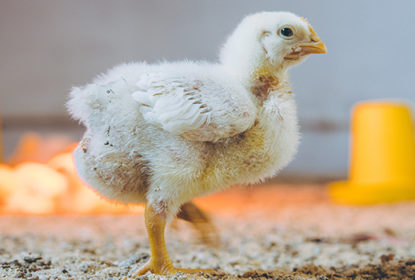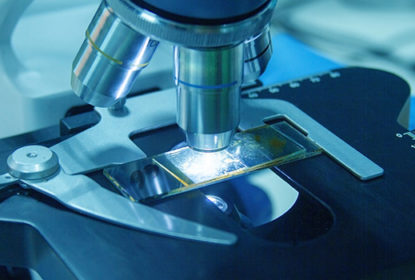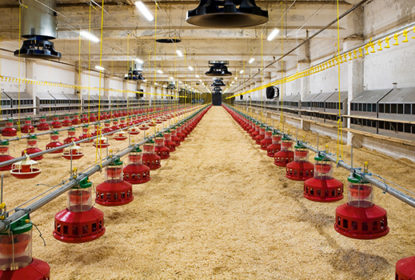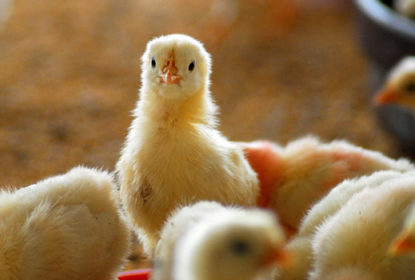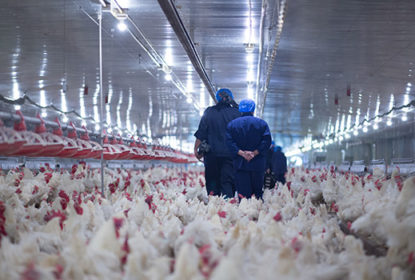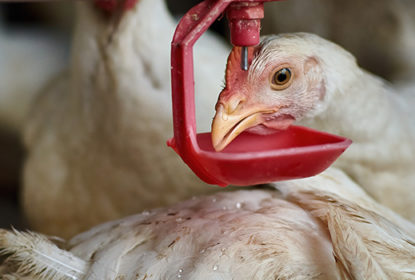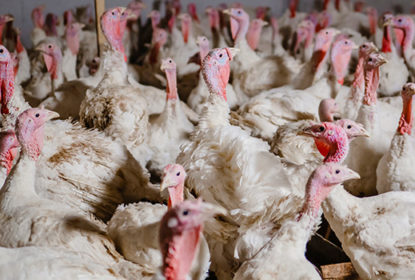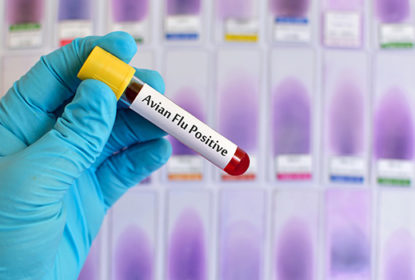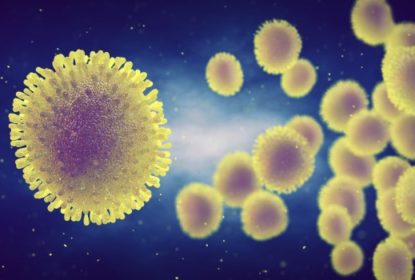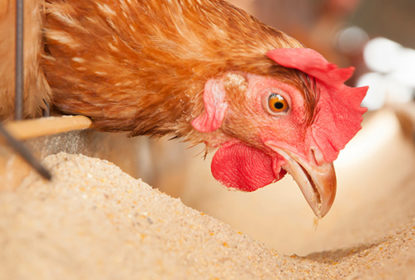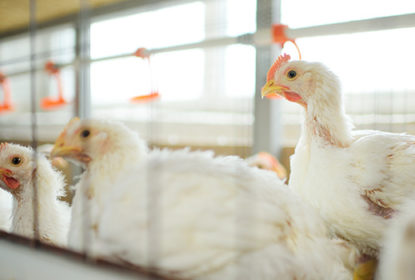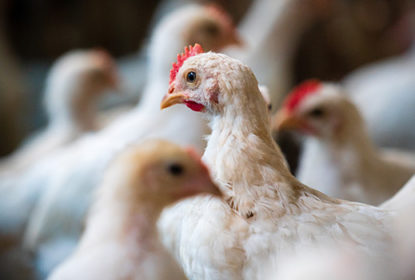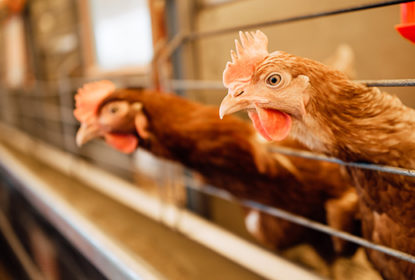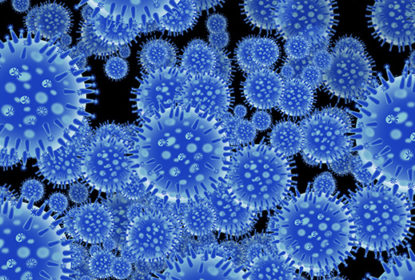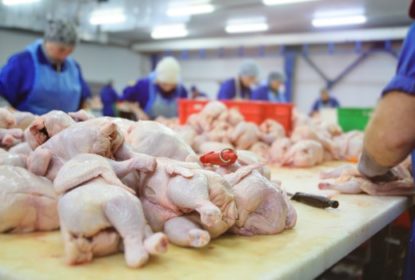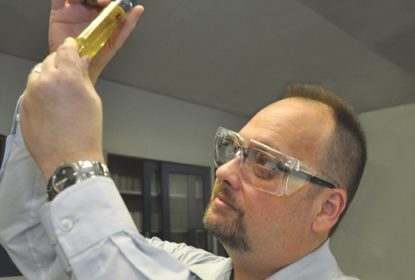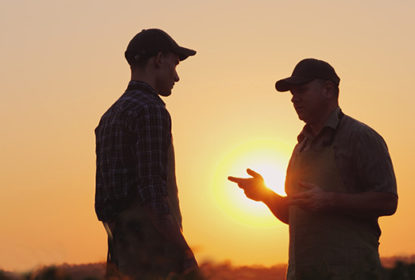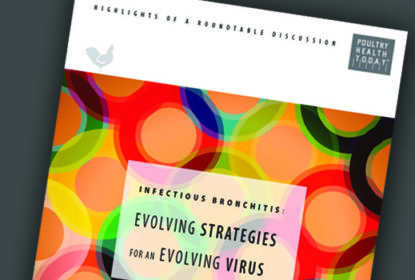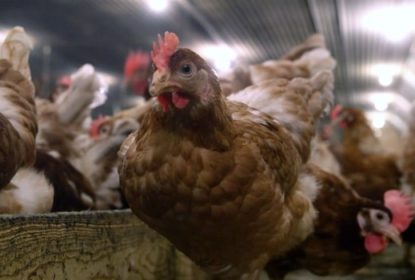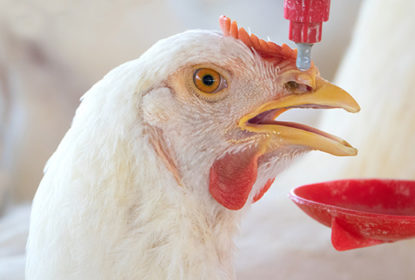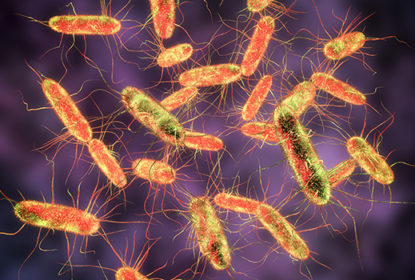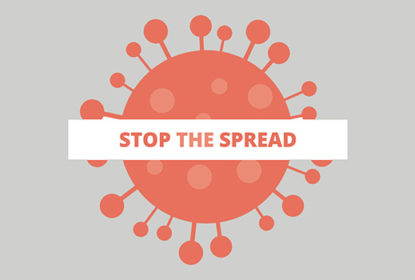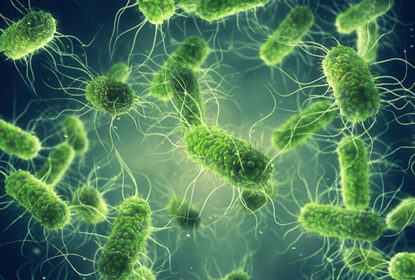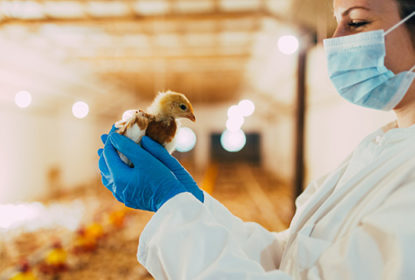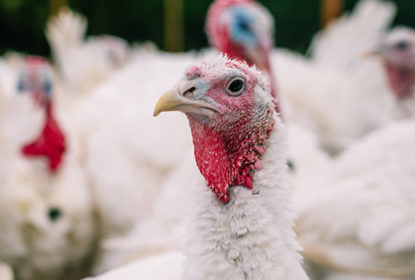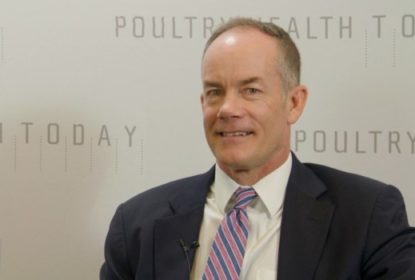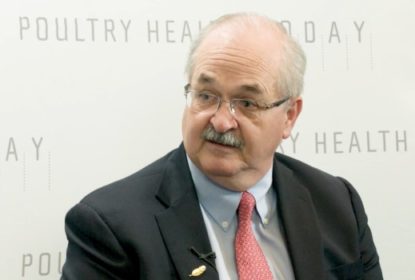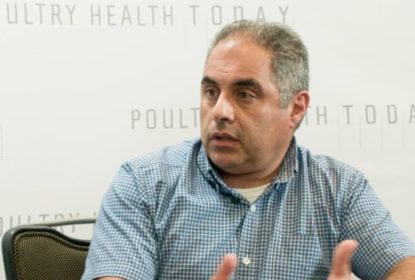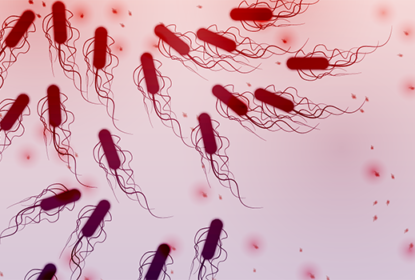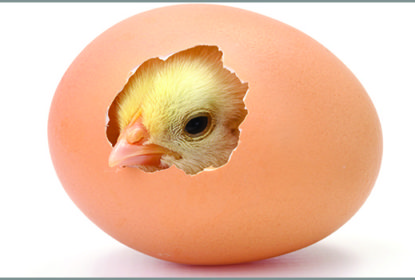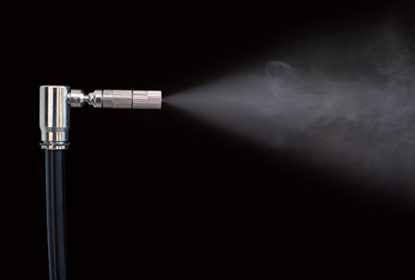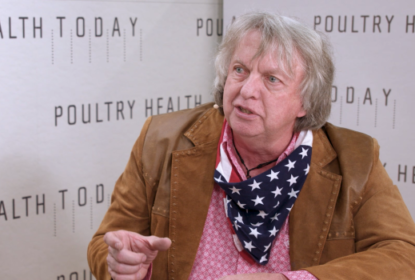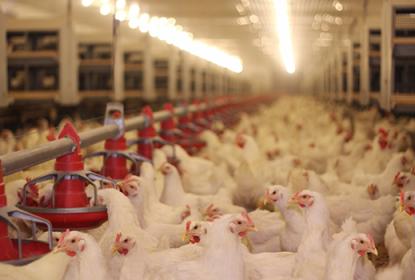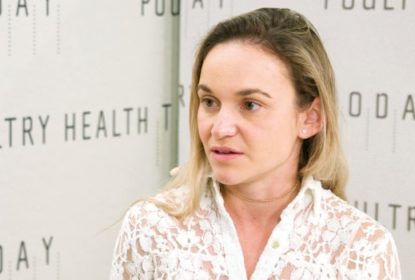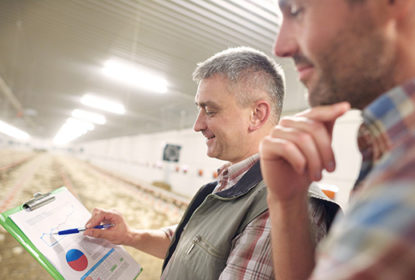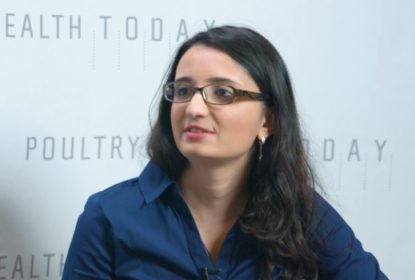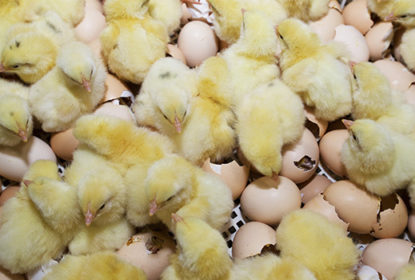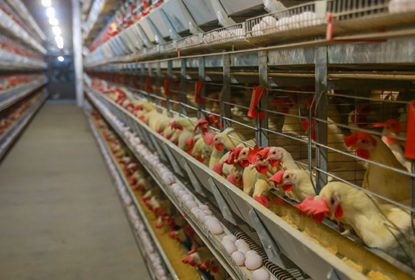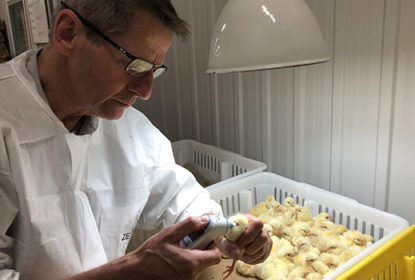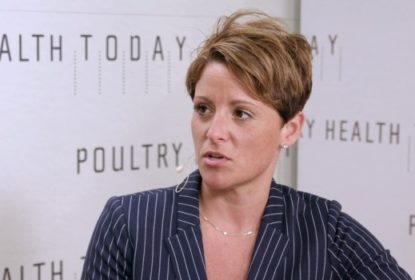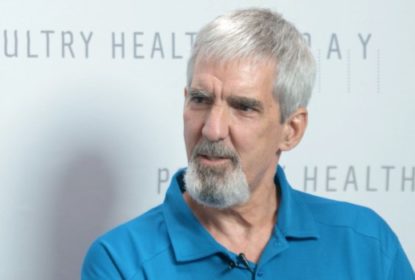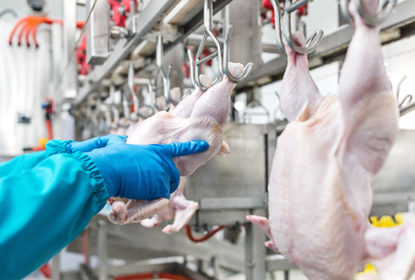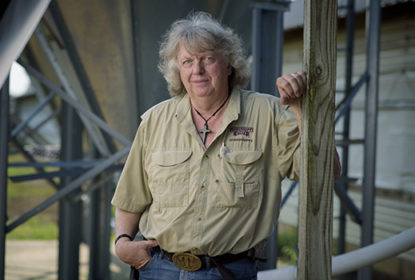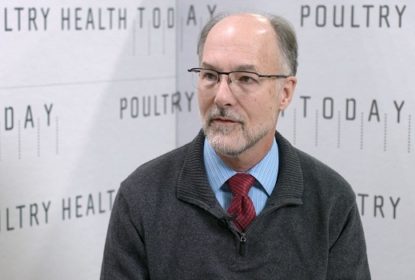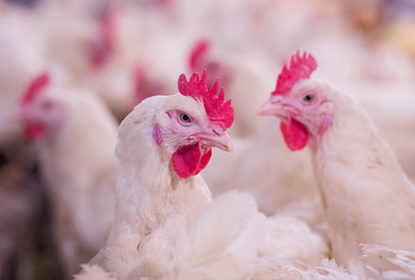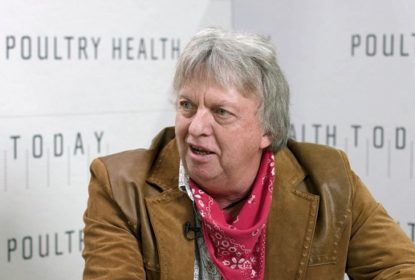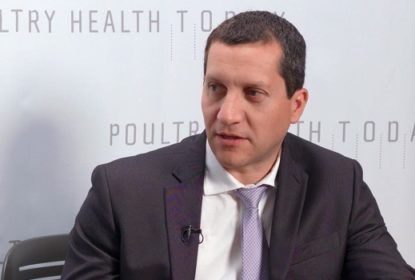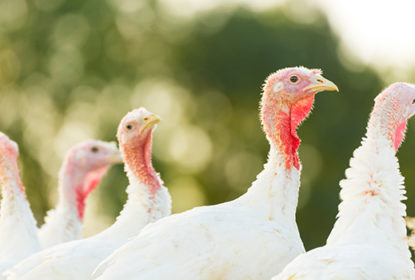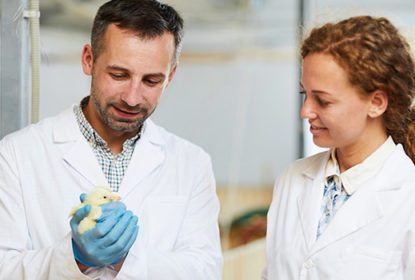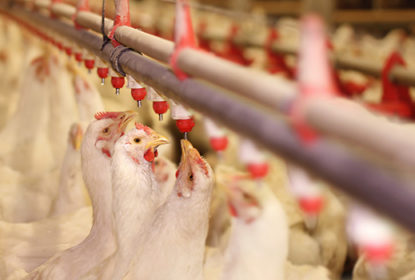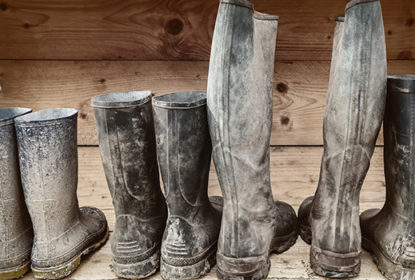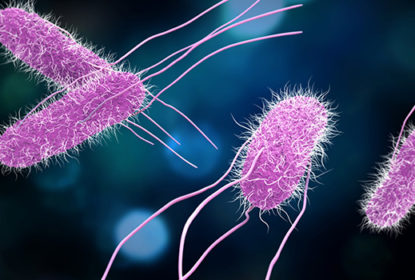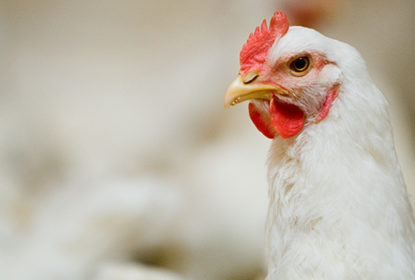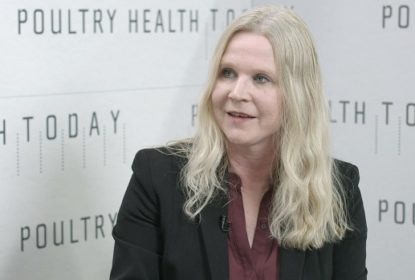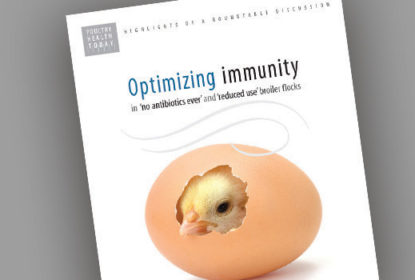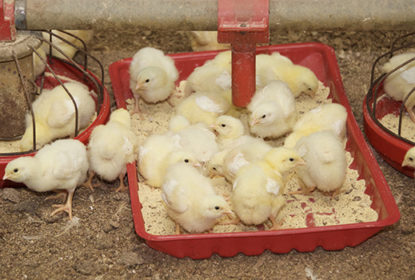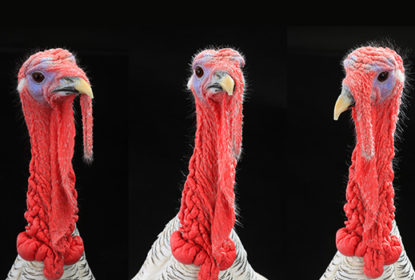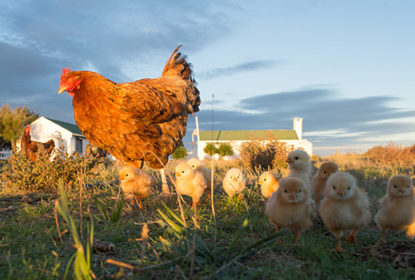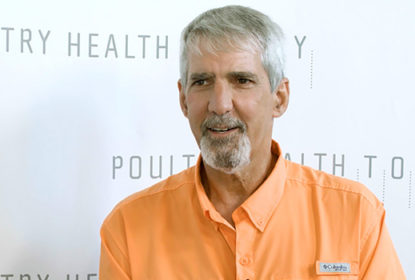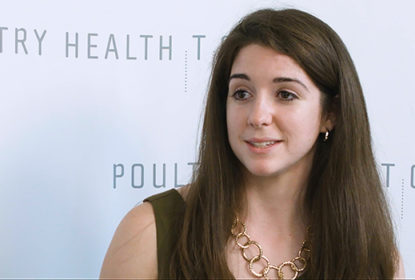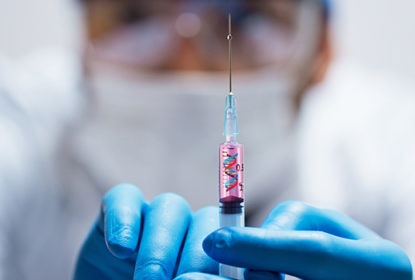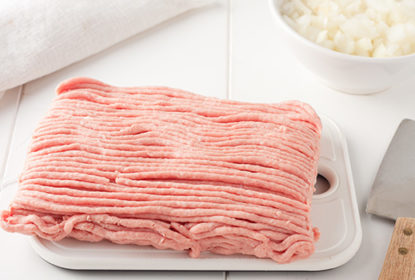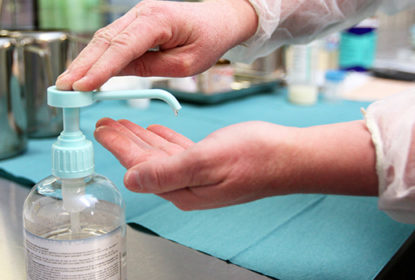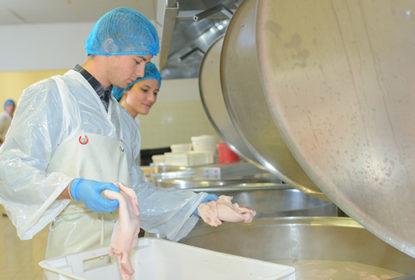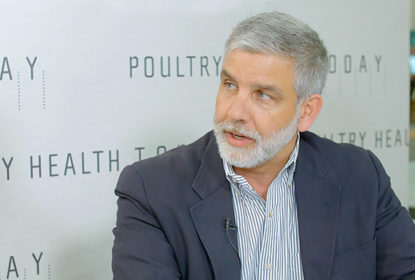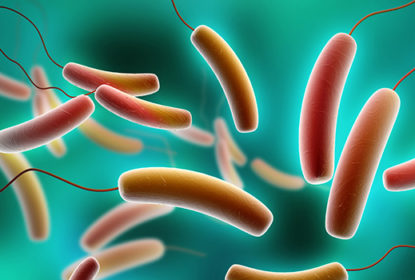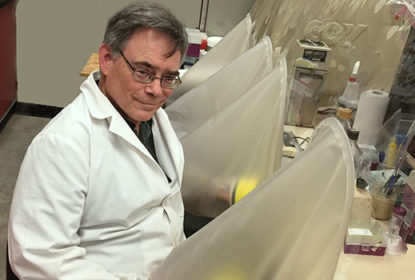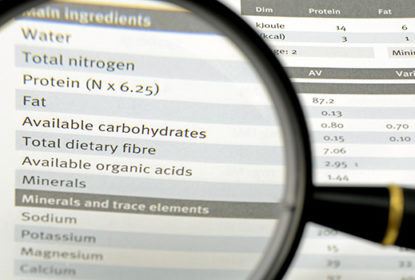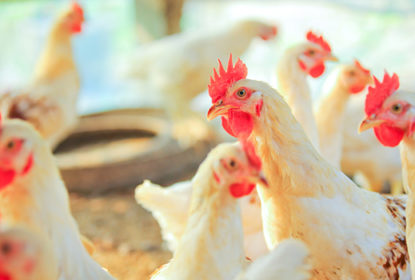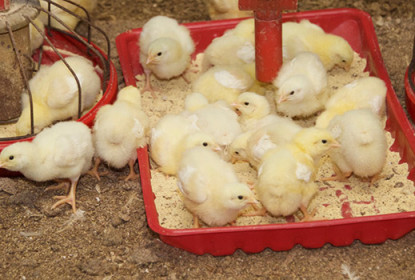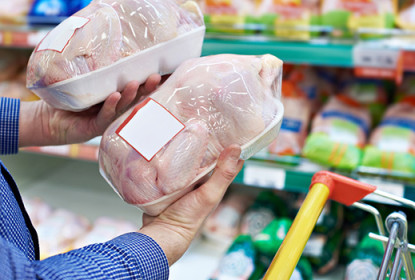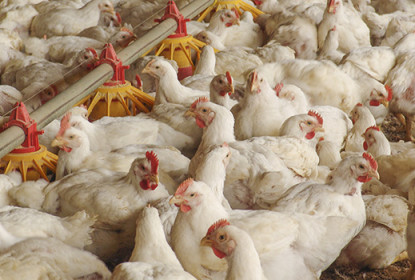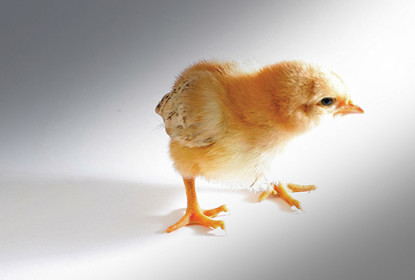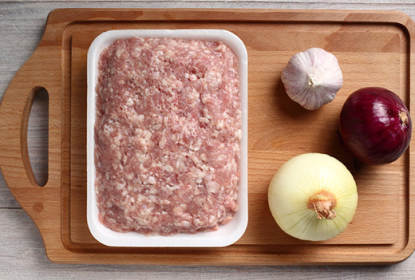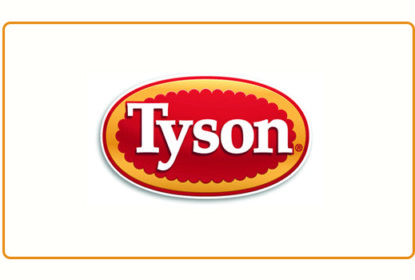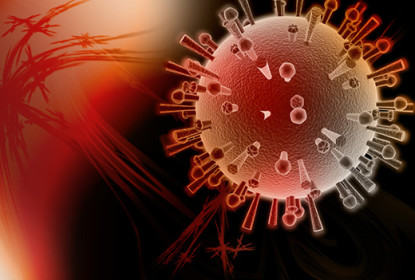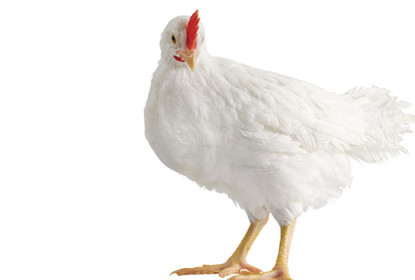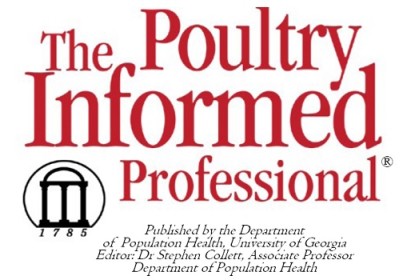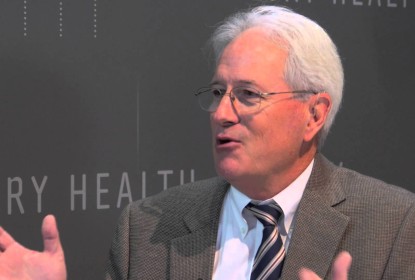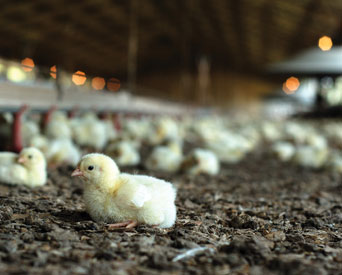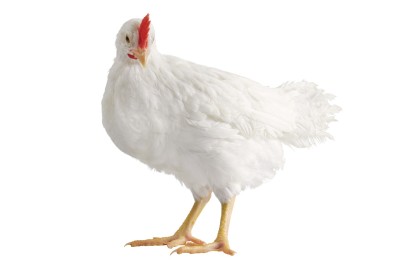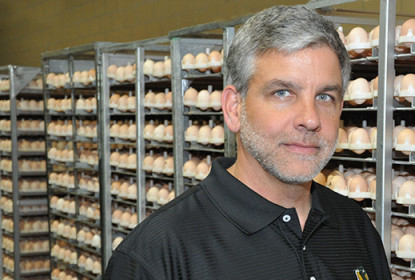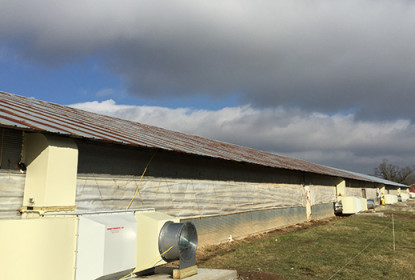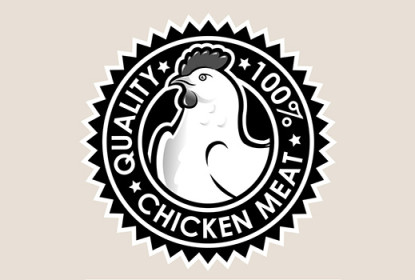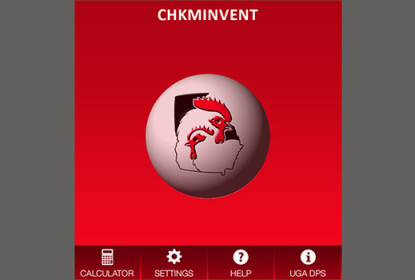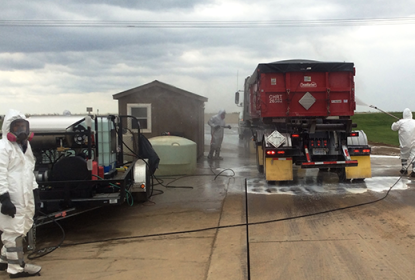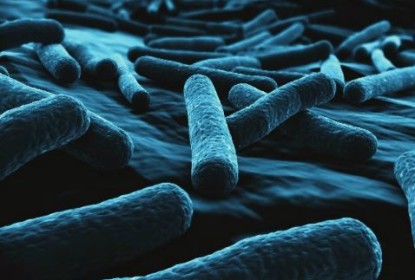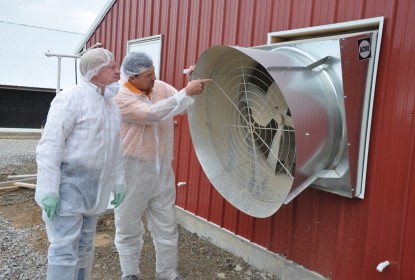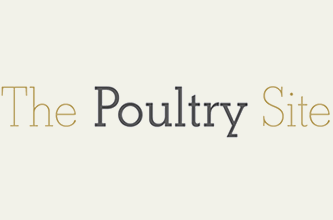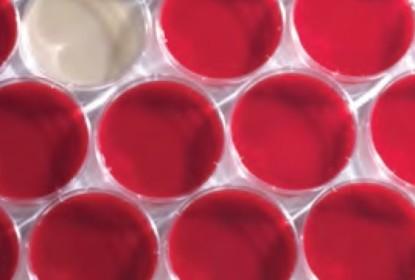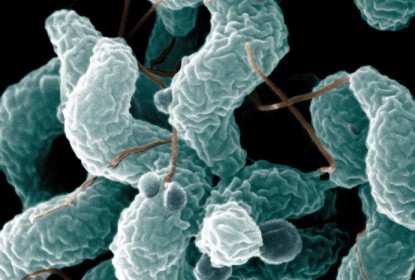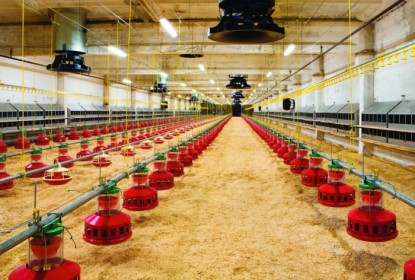Category Archive: Expert Advice, Food Safety, Global TOPICS, News, PHT GLOBAL, PHT US, TOPICS
... Home for the holidays? Poultry vet urges ‘aseptic technique’ in the kitchen
Nov 11, 2022Jennifer GrullonComments Off on Home for the holidays? Poultry vet urges ‘aseptic technique’ in the kitchen
By Robert O’Connor, DVM, MAM, Senior vice president, Foster Farms
Biosecurity, Food Safety, Global TOPICS, Interviews, News, PHT GLOBAL, PHT US, Podcast, TOPICS, Videos
... Don’t overlook feed biosecurity in efforts to manage Salmonella
Nov 02, 2022Jennifer GrullonComments Off on Don’t overlook feed biosecurity in efforts to manage Salmonella
Biosecurity in feed mills and on-farm feed storage should not be overlooked when it comes to managing the risk of Salmonella in poultry flocks, according to a turkey-health expert.... Reusing poultry litter may reduce antibiotic-resistant Salmonella
Oct 20, 2022Jennifer GrullonComments Off on Reusing poultry litter may reduce antibiotic-resistant Salmonella
Reusing poultry litter can help boost bird health and may help prevent the transfer of antibiotic-resistant Salmonella, scientists have discovered.... Diagnostics for IBH start with subtle indicators
Oct 13, 2022Jennifer GrullonComments Off on Diagnostics for IBH start with subtle indicators
Inclusion body hepatitis (IBH) infections may not offer clear-cut clinical symptoms, but there are on-farm diagnostic measures that can yield early warnings.... Breed may impact broiler response to Salmonella infection
Oct 06, 2022Jennifer GrullonComments Off on Breed may impact broiler response to Salmonella infection
Research at the University of Arkansas suggests broiler breed could affect birds’ immune response to Salmonella exposure, according to Shawna Weimer, PhD, director of the Center for Food Animal...... Replication, coverage vary among MD vaccination programs for long-lived birds
Oct 04, 2022Jennifer GrullonComments Off on Replication, coverage vary among MD vaccination programs for long-lived birds
DISCOVERIES: Marek’s disease (MD) vaccination programs for breeders and layers can vary significantly in the replication and coverage they provide, a finding that should be considered when planning...... Best-management practices key to successful NAE broiler production
Sep 15, 2022Jennifer GrullonComments Off on Best-management practices key to successful NAE broiler production
With many poultry operations switching to no-antibiotics-ever (NAE) production, management and disease control have become even more critical components.... ‘Reverse genetics’ may offer new IBV vaccine targets
Aug 04, 2022Jennifer GrullonComments Off on ‘Reverse genetics’ may offer new IBV vaccine targets
Researchers at The Pirbright Institute in the UK report that a recent study provides evidence that mutations in the genetic code for non-structural proteins “offer a promising way” to make...... Overheating soybean meal hurts gut integrity, broiler growth
Aug 01, 2022Jennifer GrullonComments Off on Overheating soybean meal hurts gut integrity, broiler growth
Improper heat treatment of soybean meal affects the intestinal integrity of broiler chickens and flock performance, according to a study by researchers at the University of Georgia.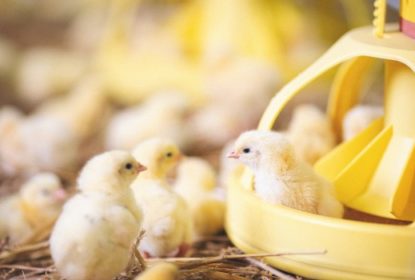
Flock welfare, Global TOPICS, Infectious Diseases, Interviews, News, PHT GLOBAL, PHT US, Podcast, Respiratory, TOPICS, Videos
... Why ‘vaccinated’ chickens still get infected with IBV — and what to do about it
Jul 26, 2022Jennifer GrullonComments Off on Why ‘vaccinated’ chickens still get infected with IBV — and what to do about it
While many vaccines and vaccination programs effectively protect against the highly contagious infectious bronchitis virus in poultry, outbreaks of the disease still occur in vaccinated flocks.
Flock welfare, Global TOPICS, Hatchery, Interviews, News, PHT GLOBAL, PHT US, Podcast, Research, Videos
... Light impacts behavior in cage-free aviaries
Jul 20, 2022Jennifer GrullonComments Off on Light impacts behavior in cage-free aviaries
Birds can move out of the reach of the workers’ hands in a multi-tier aviary system, so employees have to climb into the system to get to them. Researchers from Michigan State studied light...... Marek’s study could lead to new management strategies in poultry
Jul 06, 2022Jennifer GrullonComments Off on Marek’s study could lead to new management strategies in poultry
New research has given scientists a greater understanding of the Marek’s disease virus (MDV) that could lead to new strategies for managing the widespread, immunosuppressive disease in poultry.... Survey shows US poultry industry’s evolving yet flexible approach to coccidiosis management
Jun 13, 2022Jennifer GrullonComments Off on Survey shows US poultry industry’s evolving yet flexible approach to coccidiosis management
After years of being an afterthought in many broiler-production schemes, coccidiosis vaccines have become the cornerstone for many control programs.
Flock welfare, Global TOPICS, Infectious Diseases, Interviews, News, PHT GLOBAL, PHT US, Podcast, TOPICS, Videos
... Poultry industry can learn from COVID-19
Jun 09, 2022Jennifer GrullonComments Off on Poultry industry can learn from COVID-19
Biosecurity is not sufficient to control avian coronaviruses like infectious bronchitis in commercial poultry, no matter how good it is, said Mark Jackwood, PhD, a molecular virologist and professor...... Marek’s disease control takes careful attention to detail
Jun 07, 2022Jennifer GrullonComments Off on Marek’s disease control takes careful attention to detail
The evolution of Marek’s disease virus (MDV) has increased the pathogen’s virulence. Besides the tumors MDV is known for producing, the virus can lead to a multitude of other problems.... How to avoid performance drops when initiating coccidiosis vaccination
Jun 01, 2022Jennifer GrullonComments Off on How to avoid performance drops when initiating coccidiosis vaccination
TOOLBOX, Issue 11: An interview with Jon Schaeffer, DVM, Director of Poultry Veterinary Services, Zoetis... Special Report: New insights for managing coccidiosis in broilers
Jun 01, 2022Jennifer GrullonComments Off on Special Report: New insights for managing coccidiosis in broilers
Despite industry advances, coccidiosis remains the leading intestinal health disease of broilers. Poultry Health Today asked experts to share latest insights and recommendations for managing this...
Diagnostics, Flock welfare, Global TOPICS, Infectious Diseases, Interviews, News, PHT GLOBAL, PHT US, Podcast, Research, TOPICS, Videos
... Poor IBV vaccine performance in broiler study underlines need for surveillance
May 12, 2022Jennifer GrullonComments Off on Poor IBV vaccine performance in broiler study underlines need for surveillance
A whole-complex study of broiler breeders in Georgia found underwhelming infectious bronchitis vaccine performance – but with better surveillance and protocols, outcomes could be improved.... California surveillance reveals genetic and seasonal changes in infectious bronchitis virus
May 01, 2022Jennifer GrullonComments Off on California surveillance reveals genetic and seasonal changes in infectious bronchitis virus
Genotypes of infectious bronchitis virus (IBV) found in California between 2012 and 2020 have seen a “major shift,” according to a study investigating patterns of IBV in the state.... On-site PCR testing could aid smart antibiotic use in mycoplasmosis treatment
Apr 26, 2022Jennifer GrullonComments Off on On-site PCR testing could aid smart antibiotic use in mycoplasmosis treatment
Making use of polymerase chain reaction (PCR) testing on chicken farms can help tackle the problem of antibiotic overuse against mycoplasmosis in countries where this treatment approach is prevalent.... Turkey-farm study finds Salmonella Infantis prevalent
Apr 19, 2022Jennifer GrullonComments Off on Turkey-farm study finds Salmonella Infantis prevalent
Research studying Salmonella across one turkey producer’s farms found Salmonella Infantis to be by far the dominant serotype.... UK researchers: Watch for emerging, more infectious strains of avian flu virus
Apr 18, 2022Jennifer GrullonComments Off on UK researchers: Watch for emerging, more infectious strains of avian flu virus
According to research led by The Pirbright Institute, UK, infection with two strains of avian flu virus could lead to the emergence of a new strain with the potential to jump from birds to humans.... Tips for managing inclusion body hepatitis
Mar 25, 2022Jennifer GrullonComments Off on Tips for managing inclusion body hepatitis
TOOLBOX, Issue 27: An interview with Daniel Bautista, DVM, senior technical services, Zoetis on managing the recent resurgence of inclusion body hepatitis in broilers.... Bioshuttle programs valuable tool for managing coccidiosis
Mar 24, 2022Jennifer GrullonComments Off on Bioshuttle programs valuable tool for managing coccidiosis
Bioshuttle programs are a valuable tool for managing coccidiosis, according to Greg Mathis, PhD, Southern Poultry Research.... Highly pathogenic avian influenza found in Indiana commercial turkey flock
Feb 09, 2022Jennifer GrullonComments Off on Highly pathogenic avian influenza found in Indiana commercial turkey flock
USDA's APHIS has confirmed the presence of highly pathogenic avian influenza in a commercial turkey flock in Dubois County, IN, the first confirmed case in commercial poultry in the US since 2020.... Cutting ionophore use could do more harm than good, veterinarians warn
Feb 03, 2022Jennifer GrullonComments Off on Cutting ionophore use could do more harm than good, veterinarians warn
SOUND SCIENCE: Removal or reduction of ionophores for the control of coccidiosis in poultry could lead to increased antibiotic use, higher production costs and negative impacts on climate-change...... Sharing data can help manage layer-farm disease and increase production
Jan 04, 2022Jennifer GrullonComments Off on Sharing data can help manage layer-farm disease and increase production
Sharing and analyzing data at farm level and beyond can offer new insights that improve bird health and profitability on layer farms.... Ionophore status change would threaten bird health, sustainability, veterinarian warns
Dec 02, 2021Jennifer GrullonComments Off on Ionophore status change would threaten bird health, sustainability, veterinarian warns
There is no need to recategorize ionophores, used as feed additives against coccidiosis, as veterinary medicines, says UK poultry veterinarian Daniel Parker — and doing so could have severe...... Study questioning purity of avian reovirus samples has lab and field implications
Nov 01, 2021Jennifer GrullonComments Off on Study questioning purity of avian reovirus samples has lab and field implications
Selecting pure avian reovirus (ARV) cultures is extremely important in pathogenicity and antigenicity studies, as well as in the creation of autogenous vaccines. But in reality, many samples don’t...... Tips for uncovering toxicity in poultry flocks
Oct 12, 2021Jennifer GrullonComments Off on Tips for uncovering toxicity in poultry flocks
Toxicity is a relatively rare affliction for hens, and tracking down the source can prove challenging, as one case study outlined by a poultry diagnostics expert revealed.... IBDV linked to severe necrotic enteritis in broiler chickens
Oct 10, 2021Jennifer GrullonComments Off on IBDV linked to severe necrotic enteritis in broiler chickens
Broiler chickens exposed to infectious bursal disease virus are likely to develop more severe cases of the bacterial disease, necrotic enteritis, researchers in Canada have found.... Early IBV infections in layers can increase cysts associated with false layer syndrome
Oct 05, 2021Jennifer GrullonComments Off on Early IBV infections in layers can increase cysts associated with false layer syndrome
The timing of infectious bronchitis virus (IBV) challenge in layers can impact the development of cysts associated with false layer syndrome, scientists at the University of Georgia have discovered.... 5 ways research aims to tackle poultry-sector challenges
Aug 04, 2021Jennifer GrullonComments Off on 5 ways research aims to tackle poultry-sector challenges
Novel, science-based technologies will allow the poultry industry to get ahead of issues coming towards it.... Lessons from the Midwest’s 2015 avian flu outbreak
Jun 24, 2021Jennifer GrullonComments Off on Lessons from the Midwest’s 2015 avian flu outbreak
The 2015 outbreak of highly pathogenic avian influenza (HPAI) in Minnesota was the worst the US has ever seen. What has the poultry industry learned from this and other outbreaks?... Cross-protection vaccine protocols key to limiting DMV/1639 spread in US flocks
May 04, 2021Jennifer GrullonComments Off on Cross-protection vaccine protocols key to limiting DMV/1639 spread in US flocks
Combining serotype vaccines might be a popular approach to protecting flocks against evolving strains of infectious bronchitis virus, such as DMV/1639, but not all combinations work equally well.... Pathways to protection: How one vaccine decision can affect options for managing other diseases in broilers
Apr 22, 2021Jennifer GrullonComments Off on Pathways to protection: How one vaccine decision can affect options for managing other diseases in broilers
Broiler operations want to provide the best disease protection for the least cost, but deciding which vaccines to use and when can be a daunting task.... Good gut health starts before hatch, expert says
Mar 12, 2021Jennifer GrullonComments Off on Good gut health starts before hatch, expert says
To establish good gut health, measures to promote a healthy microbiome can’t begin soon enough, an expert reports.... Histopathology helping poultry plants use science to defend carcasses, minimize condemnations
Feb 24, 2021Jennifer GrullonComments Off on Histopathology helping poultry plants use science to defend carcasses, minimize condemnations
Veterinarians specializing in diagnosing disease in animal tissue are spending more time in processing plants helping minimize costly carcass condemnations while maintaining high food quality...... QX, 793b found to be most prevalent IBV field strains in Europe
Dec 22, 2020Jennifer GrullonComments Off on QX, 793b found to be most prevalent IBV field strains in Europe
DISCOVERIES, Issue 11: Two recent studies assessed the prevalence of various IBV strains in Europe in recent years, with QX and 793b proving the most common causes of virulent disease in chickens.... Z-CAS helping feed mills, producers get the most from medicated feed additives
Nov 30, 2020Jennifer GrullonComments Off on Z-CAS helping feed mills, producers get the most from medicated feed additives
TOOLBOX, Issue 6: An interview with Marc Howerton, Customer Analytical Services Supervisor, Zoetis... Now more than ever, vaccination is critical for managing Salmonella in layer flocks
Nov 28, 2020Jennifer GrullonComments Off on Now more than ever, vaccination is critical for managing Salmonella in layer flocks
TOOLBOX, Issue 22: An interview with Kalen Cookson, DVM, MAM, Director of Clinical Research, Zoetis... NCSU: Enterococcus co-infection makes colibacillosis deadlier in poultry
Nov 12, 2020Jennifer GrullonComments Off on NCSU: Enterococcus co-infection makes colibacillosis deadlier in poultry
Researchers from North Carolina State University have found that when a particular strain of Enterococcus is found alongside E. coli in cases of avian colibacillosis, there is a higher rate of...... Researchers decode clues to Salmonella Infantis control
Oct 05, 2020Jennifer GrullonComments Off on Researchers decode clues to Salmonella Infantis control
New research from Austria provides key regional insights into Salmonella Infantis, a foodborne pathogen that is closely linked with broiler farms and often resistant to antibiotics.... New four-way broiler breeder vaccine builds on success of Maternavac name
Sep 24, 2020Jennifer GrullonComments Off on New four-way broiler breeder vaccine builds on success of Maternavac name
TOOLBOX, Issue 20: An interview with Kalen Cookson, DVM, MAM, Director of Clinical Research, Zoetis... Sleuthing to pinpoint source of commercial flock pathogens
Sep 17, 2020Jennifer GrullonComments Off on Sleuthing to pinpoint source of commercial flock pathogens
By Philip A. Stayer, DVM, MS, ACPV, Corporate Veterinarian, Sanderson Farms, Inc.... Free booklet recaps highlights of infectious bronchitis roundtable
Sep 10, 2020Jennifer GrullonComments Off on Free booklet recaps highlights of infectious bronchitis roundtable
A colorful 28-page booklet recapping highlights of a roundtable discussion on infectious bronchitis virus is now available. The event featured experts and practitioners who shared their practical...... Treatment blend offers ‘exciting potential’ for Campylobacter control at processing
Sep 03, 2020Jennifer GrullonComments Off on Treatment blend offers ‘exciting potential’ for Campylobacter control at processing
Blending two commonly used antibacterial treatments could help processing facilities take better control of Campylobacter and reduce the risk of food-borne illnesses, according to scientists.... Managing the health challenges of moving to free-range egg production
Aug 31, 2020Jennifer GrullonComments Off on Managing the health challenges of moving to free-range egg production
Free-range egg production will bring major challenges to the way birds are produced, but it will also mean big shifts in the ways bird health and welfare need to be managed.... State-of-the-art recombinant Poulvac® Procerta™ HVT-ND protects against Newcastle and Marek’s diseases
Aug 24, 2020Jennifer GrullonComments Off on State-of-the-art recombinant Poulvac® Procerta™ HVT-ND protects against Newcastle and Marek’s diseases
TOOLBOX, Issue 19: An interview with Abigail Reith, DVM, MAM, DACPV, Technical Services Veterinarian, Zoetis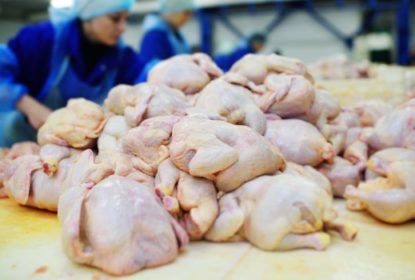
Condemnations, Food Safety, Global TOPICS, Interviews, News, PHT GLOBAL, PHT US, Podcast, TOPICS, Videos
... New avian leukosis rule expected to reduce waste, improve efficiency for processing plants and FSIS
Aug 13, 2020Jennifer GrullonComments Off on New avian leukosis rule expected to reduce waste, improve efficiency for processing plants and FSIS
Acceptance of a petition designating avian leukosis lesions on poultry carcasses as a trimmable condition is expected to reduce waste and improve efficiency at processing plants while allowing meat...... NAE production uncovers water quality challenges
Aug 13, 2020Jennifer GrullonComments Off on NAE production uncovers water quality challenges
By Tom Tabler, PhD, Extension Professor, Mississippi State University Extension Service, Poultry Science Department, Mississippi State, Mississippi... Intestinal health in the era of NAE
Aug 13, 2020Jennifer GrullonComments Off on Intestinal health in the era of NAE
By Tom Tabler, PhD, Extension Professor, Mississippi State University Extension Service, Poultry Science Department, Mississippi State, Mississippi... Check equipment now to help birds withstand summer heat
Aug 12, 2020Jennifer GrullonComments Off on Check equipment now to help birds withstand summer heat
By Jess Campbell, Jeremiah Davis and Kelly Griggs, National Poultry Technology Center, Auburn University... Antibiotics and the poultry industry: What’s next?
Aug 12, 2020Jennifer GrullonComments Off on Antibiotics and the poultry industry: What’s next?
Nearly 6 in 10 broiler chickens in the US are now raised without antibiotics. Is this all-or-nothing strategy necessarily a good trend? And what precautions need to be taken?... Tailoring control measures key to managing Salmonella
Aug 10, 2020Jennifer GrullonComments Off on Tailoring control measures key to managing Salmonella
Producers need to take more care in matching Salmonella vaccines for broiler breeders to the strain of the pathogen challenging their flocks.... Live Salmonella vaccines, some DFMs may not mix
Jul 20, 2020Jennifer GrullonComments Off on Live Salmonella vaccines, some DFMs may not mix
By Philip A. Stayer, DVM, MS, ACPV, Corporate Veterinarian, Sanderson Farms, Inc.
Flock welfare, Global TOPICS, Infectious Diseases, Interviews, News, PHT GLOBAL, PHT US, Podcast, TOPICS, Videos
... ND is stable in US but poultry industry should be on lookout for evolving strains
Jul 13, 2020Jennifer GrullonComments Off on ND is stable in US but poultry industry should be on lookout for evolving strains
Newcastle disease throughout most of the US remains stable, but the industry needs to be on guard for changes in the virus that may require adaption of ND vaccines.... Poulvac® Procerta™ HVT-ND fully protects against Newcastle disease by 19 days of age
Jun 18, 2020Jennifer GrullonComments Off on Poulvac® Procerta™ HVT-ND fully protects against Newcastle disease by 19 days of age
DISCOVERIES, Issue 5: Rigorous research and the application of cutting-edge technology by Zoetis scientists were behind the development of the newest recombinant vaccine to protect broilers from ...... Poultry biosecurity has lessons for coping with COVID-19
Jun 01, 2020Jennifer GrullonComments Off on Poultry biosecurity has lessons for coping with COVID-19
By Tom Tabler, PhD, Extension Professor, Mississippi State University Extension Service, Poultry Science Department, Mississippi State, Mississippi... Moving animal health to the back burner — if only for a moment
May 21, 2020Jennifer GrullonComments Off on Moving animal health to the back burner — if only for a moment
By Larry Rueff, DVM, Swine Vet Services, Greensburg, Indiana... CDC report urges more vaccination against Salmonella
May 13, 2020Jennifer GrullonComments Off on CDC report urges more vaccination against Salmonella
The CDC has urged more vaccination to control Salmonella in poultry flocks after latest figures revealed illnesses linked to certain strains of the pathogen were stalling or in decline.... Nearly 60% of US broilers now raised without antibiotics, but that number may have peaked
May 04, 2020Jennifer GrullonComments Off on Nearly 60% of US broilers now raised without antibiotics, but that number may have peaked
Nearly six in 10 US broilers were raised without antibiotics of any type in 2019 — but that number may have peaked.... Caution: Simple errors can derail IBV vaccine effectiveness
Apr 27, 2020Jennifer GrullonComments Off on Caution: Simple errors can derail IBV vaccine effectiveness
Common pitfalls that can occur while vaccinating broilers against infectious bronchitis virus (IBV) could derail vaccine effectiveness, panelists cautioned during an industry roundtable.... German researchers: Poultry, pigs not susceptible to COVID-19
Apr 15, 2020Jennifer GrullonComments Off on German researchers: Poultry, pigs not susceptible to COVID-19
Scientists in Germany have confirmed that pigs and chickens are not susceptible to COVID-19.... Return of RofenAid® 40 gives turkey industry dependable tool for managing coccidiosis, fowl cholera
Apr 14, 2020Jennifer GrullonComments Off on Return of RofenAid® 40 gives turkey industry dependable tool for managing coccidiosis, fowl cholera
TOOLBOX, Issue 21: An interview with David Rives, DVM, Technical Services Veterinarian, Zoetis... Highly pathogenic H7N3 avian influenza confirmed in US commercial turkey flock
Apr 10, 2020Jennifer GrullonComments Off on Highly pathogenic H7N3 avian influenza confirmed in US commercial turkey flock
A commercial turkey flock in South Carolina has tested positive for highly pathogenic H7N3 avian influenza (HPAI).... Foster Farms: Community approach key to managing coryza spread in poultry
Apr 09, 2020Jennifer GrullonComments Off on Foster Farms: Community approach key to managing coryza spread in poultry
Tackling endemic poultry diseases as a community rather than as individual producers can play an important role in controlling and limiting their spread.... Good flock management key to managing Mycoplasma synoviae resurgence
Apr 02, 2020Jennifer GrullonComments Off on Good flock management key to managing Mycoplasma synoviae resurgence
Broiler producers need to take a fresh look at housing conditions and bird management to help counter the resurgence of Mycoplasma synoviae linked to an increase in raised without antibiotics (RWA)...... Prestage Farms veterinarian: Processing chain communication critical to identify health issues early, reduce turkey condemnations
Mar 11, 2020Jennifer GrullonComments Off on Prestage Farms veterinarian: Processing chain communication critical to identify health issues early, reduce turkey condemnations
Developing good relationships across the processing chain can be critical in helping to identify and overcome issues on farm and in the processing plant.... Sanderson vet: Keeping up with variant reovirus strains remains challenging
Mar 06, 2020Jennifer GrullonComments Off on Sanderson vet: Keeping up with variant reovirus strains remains challenging
Poor uniformity, lameness and reduced water consumption are tip-offs that broilers may be infected with variant reovirus.... Failure of maternal antibodies to protect against E. coli infection highlights need for early protection
Feb 13, 2020Jennifer GrullonComments Off on Failure of maternal antibodies to protect against E. coli infection highlights need for early protection
New studies in broiler chicks show that maternal antibodies to Escherichia coli do not prevent infection.... What more can live production do to reduce Salmonella in poultry?
Dec 26, 2019Jennifer GrullonComments Off on What more can live production do to reduce Salmonella in poultry?
Successful Salmonella control throughout live poultry production requires an integrated effort, attention to detail and careful follow-through to help processing plants meet more stringent USDA...... One Health Certified label seeks balanced approach to poultry production, marketing
Dec 23, 2019Jennifer GrullonComments Off on One Health Certified label seeks balanced approach to poultry production, marketing
A new label under development for meat and poultry products will represent production that seeks a balanced approach to poultry production and marketing.... Industry needs more poultry scientists to tackle disease challenges
Dec 03, 2019Jennifer GrullonComments Off on Industry needs more poultry scientists to tackle disease challenges
More young people need to be encouraged to take up careers in poultry science if the sector is to properly tackle disease challenges which have plagued it for decades.... Salmonella’s sex life key to mitigating food safety risks
Nov 14, 2019Jennifer GrullonComments Off on Salmonella’s sex life key to mitigating food safety risks
Food safety challenges linked to Salmonella could be tackled more effectively by better understanding the sex life of bacteria, according to a leading US government veterinarian.... Ensuring strong immunity key to successful ‘no antibiotics ever’ broiler production
Nov 01, 2019Jennifer GrullonComments Off on Ensuring strong immunity key to successful ‘no antibiotics ever’ broiler production
Producers raising broilers with no or fewer antibiotics need to pay more attention to diseases that can compromise flock immunity and make birds more susceptible to primary and secondary...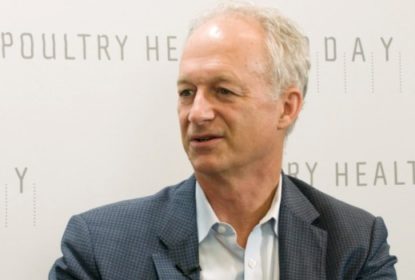
Biosecurity, Food Safety, Global TOPICS, Interviews, News, PHT GLOBAL, PHT US, Podcast, TOPICS, Videos
... Perdue veterinarian seeks answers to inconsistent foodborne pathogen load
Oct 28, 2019Jennifer GrullonComments Off on Perdue veterinarian seeks answers to inconsistent foodborne pathogen load
Taking a closer look at why incidence of Salmonella and Campylobacter varied widely on farms in the same production system helped to demonstrate the importance of management and communication with...... Moisture monitoring critical to improving bird health and welfare
Oct 23, 2019Jennifer GrullonComments Off on Moisture monitoring critical to improving bird health and welfare
Poultry shed humidity should be monitored as regularly as shed temperature and ventilation to ensure bird health and productivity is as high as it can be.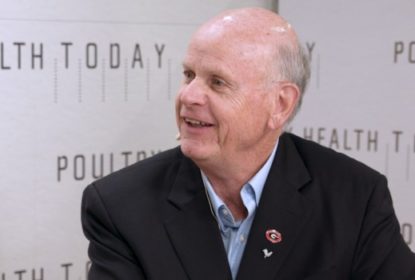
Antibiotic-free, Flock welfare, Global TOPICS, Interviews, News, PHT GLOBAL, PHT US, Podcast, TOPICS, Videos
... Coccidiosis control: Keys to success with a bioshuttle program
Oct 20, 2019Jennifer GrullonComments Off on Coccidiosis control: Keys to success with a bioshuttle program
Resistance is unlikely to be a problem in coccidiosis bioshuttle programs, Greg Mathis, PhD, Southern Poultry Research, told Poultry Health Today.... Necrotic enteritis control requires multi-pronged approach in RWA systems
Oct 17, 2019Jennifer GrullonComments Off on Necrotic enteritis control requires multi-pronged approach in RWA systems
Feeding higher levels of copper and zinc in the diet, managing litter moisture and controlling coccidiosis are keys to stopping necrotic enteritis (NE) in poultry raised without antibiotics (RWA),...... Avian pathogenic E. coli: Difficult to prevent and control
Oct 10, 2019Jennifer GrullonComments Off on Avian pathogenic E. coli: Difficult to prevent and control
The bacterium E. coli has re-emerged in broiler operations, which seems to coincide with poultry companies’ switch to ‘no antibiotics ever’ (NAE) programs.
Antibiotic-free, Flock welfare, Global TOPICS, Interviews, News, PHT GLOBAL, PHT US, Podcast, Videos
... Helping contract growers’ transition to no-antibiotics-ever broiler production
Sep 29, 2019Jennifer GrullonComments Off on Helping contract growers’ transition to no-antibiotics-ever broiler production
Successful transition from conventional to no-antibiotics-ever (NAE) broiler production requires awareness of all the changes needed and lots of advance planning.... ‘Let’s keep it up’: Maintaining the efficacy of Zoamix®
Sep 25, 2019Jennifer GrullonComments Off on ‘Let’s keep it up’: Maintaining the efficacy of Zoamix®
TOOLBOX, Issue 15: An interview with Jon Schaeffer, DVM, PhD, Senior Director, Technical Services, US Poultry, Zoetis
Flock welfare, Global TOPICS, Interviews, News, PHT GLOBAL, PHT US, Podcast, Sustainability, TOPICS, Videos
... Better air circulation, moderately lower humidity improve paw quality
Sep 23, 2019Jennifer GrullonComments Off on Better air circulation, moderately lower humidity improve paw quality
Increasing air circulation coupled with moderate reductions in humidity can dramatically improve paw quality, Michael Czarick and Connie Mou, University of Georgia, told Poultry Health Today.... Tips for ensuring best field vaccination results with Poulvac® ST or Poulvac® E. coli
Sep 12, 2019Jennifer GrullonComments Off on Tips for ensuring best field vaccination results with Poulvac® ST or Poulvac® E. coli
TOOLBOX, Issue 12: An interview with Lloyd Keck, DVM, ACPV, consulting veterinarian, on ensuring the best field vaccination results against Salmonella and E. coli.... Sprinkler systems benefit animal welfare, reduce water use
Sep 12, 2019Jennifer GrullonComments Off on Sprinkler systems benefit animal welfare, reduce water use
Sprinkler systems used in conjunction with cool cells during hot summer weather can not only benefit animal welfare, they can dramatically reduce water use.... Poultry litter management key to MS control
Aug 28, 2019Jennifer GrullonComments Off on Poultry litter management key to MS control
Litter topped the list of environmental factors most consistently positive for Mycoplasma synoviae (MS), Naola Ferguson, DVM, associate professor at the University of Georgia, told Poultry Health...... Preharvest reduction of Salmonella, Campylobacter key to better control efforts
Aug 27, 2019Jennifer GrullonComments Off on Preharvest reduction of Salmonella, Campylobacter key to better control efforts
By Abhinav Upadhyay, DVM, PhD, postdoctoral associate and Dan J. Donoghue, PhD, professor, University of Arkansas... Preventive measures are only option for combatting key parasites in turkeys
Aug 19, 2019Jennifer GrullonComments Off on Preventive measures are only option for combatting key parasites in turkeys
Turkey producers will need to rely on preventive measures including biosecurity, good gut health and genetic selection to combat three key flagellated protozoan parasites that can affect their...... Zinc can help combat infectious bronchitis in poultry
Aug 14, 2019Jennifer GrullonComments Off on Zinc can help combat infectious bronchitis in poultry
Research on infectious bronchitis virus remains a top priority for the poultry industry. Not only is it widespread, but new serotypes also continue to emerge due to mutations and recombination events...... Water quality: No room for error in NAE flocks
Aug 13, 2019Jennifer GrullonComments Off on Water quality: No room for error in NAE flocks
By Tom Tabler, PhD, Extension Professor, Mississippi State University Extension Service, Poultry Science Department, Mississippi State, Mississippi... Report: US poultry producers slash use of medically important antimicrobials while shifting focus to disease prevention
Aug 08, 2019Jennifer GrullonComments Off on Report: US poultry producers slash use of medically important antimicrobials while shifting focus to disease prevention
US poultry producers dramatically decreased their use of medically important antimicrobials over a 5-year period ending in 2017, according to a new report released by Randall Singer, DVM, PhD,...... Focus on these 4 areas to ensure broiler chick success
Jul 25, 2019Jennifer GrullonComments Off on Focus on these 4 areas to ensure broiler chick success
Faultless management in the first few days of a chick’s life is critical to ensuring birds remain healthy and productive for the rest of the crop.... Focal duodenal necrosis in table-egg layers easily overlooked
Jul 15, 2019Jennifer GrullonComments Off on Focal duodenal necrosis in table-egg layers easily overlooked
Focal duodenal necrosis in table-egg layers can be an easily overlooked cause of drops in egg production and egg-case weight loss.... When vaccinating broilers against Salmonella may be worthwhile
Jul 09, 2019Jennifer GrullonComments Off on When vaccinating broilers against Salmonella may be worthwhile
Vaccinating broilers is a big investment and may not be needed on all farms, but it can be a worthwhile move if there are high loads of Salmonella coming into the processing plant.... World poultry industry still struggling with necrotic enteritis
Jun 27, 2019Jennifer GrullonComments Off on World poultry industry still struggling with necrotic enteritis
NE remains a formidable challenge in broilers raised without antibiotics, and preventing the disease means steering clear of predisposing factors and implementing a rigid coccidiosis-control plan.... Zoetis Fast Tracking Relaunch of Avian Coryza Vaccine to Aid U.S. Disease Outbreaks
Jun 24, 2019Jennifer GrullonComments Off on Zoetis Fast Tracking Relaunch of Avian Coryza Vaccine to Aid U.S. Disease Outbreaks
Zoetis has reintroduced the vaccine Poulvac® Coryza ABC IC3 to help U.S. poultry producers combat outbreaks of avian coryza, an acute respiratory infection.... Maslow’s Pyramid: Self-actualization for chickens?
Jun 17, 2019Jennifer GrullonComments Off on Maslow’s Pyramid: Self-actualization for chickens?
By Philip A. Stayer, DVM, MS, ACPV, Corporate Veterinarian, Sanderson Farms, Inc.... A few tools to improve brooding, not antibiotic alternatives, are key to NE prevention
May 20, 2019Jennifer GrullonComments Off on A few tools to improve brooding, not antibiotic alternatives, are key to NE prevention
By Reg Smith, Vice President, Operations, Atlantic Poultry, Nova Scotia, Canada, Formerly Chair, British Poultry Council’s Antibiotic Stewardship strategy... Poultry producers facing higher hurdles with USDA food-safety standards
May 16, 2019Jennifer GrullonComments Off on Poultry producers facing higher hurdles with USDA food-safety standards
Poultry producers can expect to jump higher hurdles as USDA continues to raise the bar for food safety.... More than half of US broilers raised without antibiotics in 2018
May 06, 2019Jennifer GrullonComments Off on More than half of US broilers raised without antibiotics in 2018
Broilers raised without antibiotics accounted for 51% of total US production in 2018 — an 11-point jump from the previous year and, more significantly, up from 3% in 2014.... Hatchery hygiene helps limit broiler E. coli mortality risk
Apr 24, 2019Jennifer GrullonComments Off on Hatchery hygiene helps limit broiler E. coli mortality risk
Disinfecting eggs and improving overall hygiene in the hatchery could dramatically reduce the risk of mortality linked to E. coli infections, scientists say.... Life without antibiotics: Field lessons learned the hard way
Apr 15, 2019Jennifer GrullonComments Off on Life without antibiotics: Field lessons learned the hard way
Producers need to think long and hard before jumping into “no antibiotics ever” (NAE) poultry production.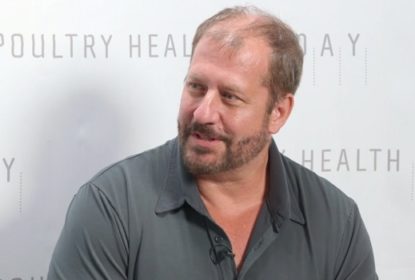
Diagnostics, Flock welfare, Global TOPICS, Interviews, News, PHT GLOBAL, PHT US, Podcast, Respiratory, TOPICS, Videos
... Genomic sequencing could aid ILT control efforts in poultry
Apr 09, 2019Jennifer GrullonComments Off on Genomic sequencing could aid ILT control efforts in poultry
Molecular virology is already leading to discoveries that will improve management of ILT, according to Stephen Spatz, PhD, molecular virologist with USDA’s Southeast Poultry Research Laboratory,...... Navigating the maze of alternative products for necrotic enteritis control
Apr 08, 2019Jennifer GrullonComments Off on Navigating the maze of alternative products for necrotic enteritis control
The effectiveness of antibiotic alternatives is going to vary among “no antibiotics ever” production systems, and it’s up to the producers to figure out which alternatives will work.
Flock welfare, Global TOPICS, Interviews, News, PHT GLOBAL, PHT US, Podcast, Sustainability, TOPICS, Videos
... Urban chicken movement requires legislators to learn chicken basics
Apr 04, 2019Jennifer GrullonComments Off on Urban chicken movement requires legislators to learn chicken basics
Legislators need to know some basics about raising chickens in response to an upsurge in the “urban chicken” trend, Nat Tablante, DVM, told Poultry Health Today.... Effective biosecurity requires addressing the culture of a company
Mar 29, 2019Jennifer GrullonComments Off on Effective biosecurity requires addressing the culture of a company
Effective biosecurity on poultry farms requires developing the kind of culture that motivates everyone in the company to adhere to the procedures that protect flocks from infectious disease.... Novel technologies needed to combat IB in chickens
Mar 27, 2019Jennifer GrullonComments Off on Novel technologies needed to combat IB in chickens
Despite decades of vaccination, the world poultry industry’s ongoing battle with infectious bronchitis (IB) continues to rage and points to the need for novel technologies to combat the disease.... Gizzard changes seen in NAE flocks but diagnosis is murky
Mar 21, 2019Jennifer GrullonComments Off on Gizzard changes seen in NAE flocks but diagnosis is murky
Raising broilers without antibiotics appears to be affecting the gizzard in ways that aren’t yet fully appreciated, and it’s not clear if the changes observed are true gizzard erosions, Jessica...... Biosecurity expert sees more room for improvement on poultry farms
Mar 19, 2019Jennifer GrullonComments Off on Biosecurity expert sees more room for improvement on poultry farms
Biosecurity on commercial poultry farms has come a long way but still has far to go, Joseph Giambrone, PhD, professor of poultry science, Auburn University, told Poultry Health Today.... USDA poultry inspections can help improve live production, processing
Mar 15, 2019Jennifer GrullonComments Off on USDA poultry inspections can help improve live production, processing
By Philip A. Stayer, DVM, MS, ACPV Corporate Veterinarian Sanderson Farms, Inc.
Global TOPICS, Infectious Diseases, Interviews, News, PHT GLOBAL, PHT US, Podcast, Respiratory, TOPICS, Videos
... Mycoplasma synoviae demanding more attention as poultry industry grasps its full impact
Feb 27, 2019Jennifer GrullonComments Off on Mycoplasma synoviae demanding more attention as poultry industry grasps its full impact
Emerging, variant strains of Mycoplasma synoviae are causing eggshell apex abnormalities as well as production drops in both layer and breeding flocks worldwide, Anneke Feberwee, DVM, PhD, from GD...... Management key to preventing green muscle disease in broilers
Feb 18, 2019Jennifer GrullonComments Off on Management key to preventing green muscle disease in broilers
By Tom Tabler, PhD, Extension Professor, Mississippi State University Extension Service, Poultry Science Department, Mississippi State, Mississippi... Vaccination of broilers ‘quick and easy’ way to get Salmonella under control
Jan 24, 2019Jennifer GrullonComments Off on Vaccination of broilers ‘quick and easy’ way to get Salmonella under control
Vaccination of broilers against Salmonella may be the best and most expedient option for producers struggling to meet USDA performance standards at the processing plant, said Chuck Hofacre, DVM, PhD,...... To manage IBDV, ‘let the bird tell you what to do’
Jan 16, 2019Jennifer GrullonComments Off on To manage IBDV, ‘let the bird tell you what to do’
Conventional wisdom dictates that infectious bursal disease virus (IBDV) field strains should determine the vaccine strategy. However, a recent study from Brazil indicates the reverse is also true.... Commercial poultry vets can help backyard growers, and themselves, by sharing tips on biosecurity
Jan 14, 2019Jennifer GrullonComments Off on Commercial poultry vets can help backyard growers, and themselves, by sharing tips on biosecurity
Improved communication between poultry company veterinarians and backyard chicken growers could help improve biosecurity and reduce disease spread for all flocks.... Selection of IBV GA 08 vaccine, proper administration can minimize reactions
Dec 15, 2018Jennifer GrullonComments Off on Selection of IBV GA 08 vaccine, proper administration can minimize reactions
TOOLBOX, Issue 10: An interview with Kalen Cookson, DVM, MAM, Director of Clinical Research, Zoetis... Hurricane Florence and the poultry industry: Coping with the aftermath
Dec 13, 2018Jennifer GrullonComments Off on Hurricane Florence and the poultry industry: Coping with the aftermath
By Philip A. Stayer, DVM, MS, ACPV Corporate Veterinarian Sanderson Farms, Inc.... Can water treatments help reduce Salmonella levels before processing?
Dec 06, 2018Jennifer GrullonComments Off on Can water treatments help reduce Salmonella levels before processing?
Feed withdrawal before moving broilers to the processing plant appears to increase their susceptibility to Salmonella, indicates research from the University of Georgia.... Is genetics the key for lasting IBV immunity?
Dec 03, 2018Jennifer GrullonComments Off on Is genetics the key for lasting IBV immunity?
Manipulating the immune response may be one way infectious bronchitis virus (IBV) is controlled in the future, predict researchers studying genetic lines of poultry.... Fresh approach to coccidiosis needed to tackle increase in broiler gut damage
Nov 28, 2018Jennifer GrullonComments Off on Fresh approach to coccidiosis needed to tackle increase in broiler gut damage
Changes in the behavior of one of the most important coccidial pathogens means poultry producers should take a fresh look at how they deal with the parasite.... Lack of approved medications continues to stymie welfare-minded turkey producers
Nov 20, 2018Jennifer GrullonComments Off on Lack of approved medications continues to stymie welfare-minded turkey producers
Another year, another survey and more long faces on US turkey producers frustrated by the lack of approved, efficacious medications — a problem they rated as the top health issue threatening...... Heat stress may impair immune system in broilers
Nov 08, 2018Jennifer GrullonComments Off on Heat stress may impair immune system in broilers
Heat stress in broilers induced lesions of lymphoid tissues, indicating immune system impairment, but it’s not yet known if heat stress affects the vulnerability or severity of coccidiosis.
Diagnostics, Global TOPICS, Interviews, News, PHT GLOBAL, PHT US, Podcast, Respiratory, TOPICS, Videos
... Consistency, follow-up key to controlling IBV
Nov 05, 2018Jennifer GrullonComments Off on Consistency, follow-up key to controlling IBV
Infectious bronchitis virus (IBV) is a “moving target” and trying to keep ahead of it requires consistency and follow-up, explained Sjaak de Wit, DVM, PhD, of GD Animal Health, the Netherlands.... Vaccination protects broilers from IBV despite exposure to moderate ammonia levels
Oct 21, 2018Jennifer GrullonComments Off on Vaccination protects broilers from IBV despite exposure to moderate ammonia levels
Properly vaccinated commercial broilers are protected from an infectious bronchitis virus (IBV) challenge despite exposure to moderate ammonia levels, according to a study that surprised researchers.... AAAP issues call for papers for 2019 conference
Oct 18, 2018Jennifer GrullonComments Off on AAAP issues call for papers for 2019 conference
The American Association of Avian Pathologists (AAAP) is now accepting abstract submissions for its 2019 conference, Aug. 2-6, Washington, DC. The deadline is Dec. 3, 2018.... Proper water pressure, volume essential to good flock performance
Oct 03, 2018Jennifer GrullonComments Off on Proper water pressure, volume essential to good flock performance
By Tom Tabler, PhD, Extension Professor, Mississippi State University Extension Service, Poultry Science Department, Mississippi State, MS... Study shows how unchanged boots disrupt biosecurity
Sep 26, 2018Jennifer GrullonComments Off on Study shows how unchanged boots disrupt biosecurity
Poultry farmers looking for ways to reduce the spread of viruses and bacteria in their facilities need look no further than the boots on their feet.... Modified-live vaccination reduced salmonellosis in Brazilian study
Sep 20, 2018Jennifer GrullonComments Off on Modified-live vaccination reduced salmonellosis in Brazilian study
New research confirms that modified-live vaccines (MLVs) can effectively reduce salmonellosis in broilers — a leading cause of food poisoning in humans.... SPECIAL REPORT – IBV: Managing a moving target
Sep 07, 2018Jennifer GrullonComments Off on SPECIAL REPORT – IBV: Managing a moving target
Infectious bronchitis virus, or IBV, is a year-round threat to poultry flocks, but it's especially challenge in the cooler months when producers reduce ventilation to save on energy costs.... Controlling coccidiosis helps prevent histomoniasis in broiler pullets
Sep 04, 2018Jennifer GrullonComments Off on Controlling coccidiosis helps prevent histomoniasis in broiler pullets
The incidence of histomoniasis, commonly known as blackhead disease, is increasing in Southeastern US broiler-breeding operations — and young breeders 25 to 30 weeks old seem particularly...... Putting paper under chick’s drinkers: Is it really helpful?
Aug 08, 2018Jennifer GrullonComments Off on Putting paper under chick’s drinkers: Is it really helpful?
Placing paper under water lines increases water consumption by baby chicks, but only for the first 3 or 4 hours after house placement, research indicates.... Let there be light: Early exposure to UV aids broiler behavior, performance
Jul 27, 2018Jennifer GrullonComments Off on Let there be light: Early exposure to UV aids broiler behavior, performance
Adding windows to poultry houses is an inexpensive way to improve the environment for broilers and possibly improve productivity, according to Rachel Lynn Dennis, PhD, assistant professor at the...... Footpad dermatitis a greater concern in chickens grown to older ages
Jul 26, 2018Jennifer GrullonComments Off on Footpad dermatitis a greater concern in chickens grown to older ages
Footpad dermatitis is more likely to be a problem among broilers grown to an older age, but it can be remedied if producers intervene in time, Tom Tabler, PhD, professor with Mississippi State...... Natural disease resistance could be bred into chickens, scientists say
Jul 20, 2018Jennifer GrullonComments Off on Natural disease resistance could be bred into chickens, scientists say
Selecting birds that are naturally more resistant to disease could help the poultry industry reduce antibiotics use in the future, say researchers.... Specialists share tips for optimizing immunity in ‘no antibiotics ever’ and ‘reduced use’ broiler flocks
Jul 14, 2018Jennifer GrullonComments Off on Specialists share tips for optimizing immunity in ‘no antibiotics ever’ and ‘reduced use’ broiler flocks
Finding ways to optimize immunity and give broilers more “staying power” could be the best strategy for maintaining the health and welfare of broilers, according to disease specialists at a...... More amino acids, feed aid broiler chicks vaccinated for coccidiosis
Jun 19, 2018Jennifer GrullonComments Off on More amino acids, feed aid broiler chicks vaccinated for coccidiosis
Feeding broilers a diet high in amino acids, along with more feed, can minimize the adverse effects on performance that sometimes occur after coccidiosis vaccination.... Gene technology has potential to multiply vaccine benefits
May 15, 2018Jennifer GrullonComments Off on Gene technology has potential to multiply vaccine benefits
Scientists in the UK have discovered a way to modify a Marek’s disease vaccination so that it could be potentially be used to protect against a number of significant poultry diseases.... Tyson vet: Act quickly on unexplained poultry mortality
May 01, 2018Jennifer GrullonComments Off on Tyson vet: Act quickly on unexplained poultry mortality
Quick action by breeder managers and veterinarians is credited with the rapid resolution of an avian influenza (AI) outbreak in Tennessee in March of 2017.... Lack of medications, veterinarians hamper turkey industry
Apr 10, 2018Jennifer GrullonComments Off on Lack of medications, veterinarians hamper turkey industry
The US turkey industry continues to be hampered by a lack of approved efficacious drugs, according to a 2017 survey. Since 2005, four medications have been withdrawn, leaving the industry without any...... Biosecurity: ‘It doesn’t have to be boring’
Apr 10, 2018Jennifer GrullonComments Off on Biosecurity: ‘It doesn’t have to be boring’
Even though biosecurity is a critically important subject, many poultry producers tune it out — for the simple reason that it bores them, said Nathaniel Tablante, DVM, a professor and poultry...... 6 steps to increasing broiler feed intake
Mar 15, 2018Jennifer GrullonComments Off on 6 steps to increasing broiler feed intake
Making small management changes on poultry farms and tracking their effects can help increase feed intake and maximize profitability, according to a leading nutritionist.... Import restrictions enforced after avian flu outbreaks in Africa
Mar 15, 2018Jennifer GrullonComments Off on Import restrictions enforced after avian flu outbreaks in Africa
Live chicken imports have been restricted in Zambia has part of the government’s efforts to limit the resurgence of a highly pathogenic form of avian influenza (HPAI).... ‘Inspect what you expect’ applies to poultry vaccination crews
Mar 09, 2018Jennifer GrullonComments Off on ‘Inspect what you expect’ applies to poultry vaccination crews
By Philip A. Stayer, DVM, MS, ACPV Corporate Veterinarian Sanderson Farms, Inc.... Clostridial dermatitis: Why is it so prevalent in turkeys?
Feb 09, 2018Jennifer GrullonComments Off on Clostridial dermatitis: Why is it so prevalent in turkeys?
Skin lesions in turkeys open the door to Clostridium infections and clostridial dermatitis, the most important disease in the turkey industry, according to a study by Kakambi Nagaraja, PhD,...... Commercial and backyard poultry production: Bringing two worlds together for better biosecurity
Jan 14, 2018Jennifer GrullonComments Off on Commercial and backyard poultry production: Bringing two worlds together for better biosecurity
by Tom Tabler, PhD Extension Professor Mississippi State University Extension Service, Poultry Science Department Mississippi State, MS... Site-specific biosecurity key to disease protection
Jan 09, 2018Jennifer GrullonComments Off on Site-specific biosecurity key to disease protection
Egg producers are being urged to not adopt a “one size fits all” approach to biosecurity in a bid to keep avian influenza (AI) away from their flocks this winter.... South African producers ‘unprepared’ for bird flu, expert says
Jan 08, 2018Jennifer GrullonComments Off on South African producers ‘unprepared’ for bird flu, expert says
South Africa’s poultry farmers are scrambling to boost biosecurity measures after being “caught out” by an outbreak of avian influenza, according one of the country’s top vets.... Plan B: Using sentinel birds to track poultry viruses when you can’t obtain SPF birds
Dec 15, 2017Jennifer GrullonComments Off on Plan B: Using sentinel birds to track poultry viruses when you can’t obtain SPF birds
Sometimes the best way to identify disease problems is to use sentinel birds along with other diagnostic tools, but the specific-pathogen-free (SPF) birds used for this purpose aren’t always...... Broiler-house management is key to preventing winter respiratory disease
Dec 15, 2017Jennifer GrullonComments Off on Broiler-house management is key to preventing winter respiratory disease
By Tak Niino, VMD Technical services veterinarian Zoetis Inc.... Paw quality in broilers: Why it’s important
Dec 13, 2017Jennifer GrullonComments Off on Paw quality in broilers: Why it’s important
By Tom Tabler, PhD Extension Professor Mississippi State University Extension Service, Poultry Science Department Mississippi State, Mississippi... Deadly duo: Study shows link between E. maxima, Clostridium
Dec 12, 2017Jennifer GrullonComments Off on Deadly duo: Study shows link between E. maxima, Clostridium
New research by Callie McQuain, DVM, veterinarian and grad student at the University of Georgia, substantiates anecdotal field experience indicating that Eimeria maxima is the type of coccidia that...... Is incentivized vaccination the answer to poultry’s public-health woes?
Dec 07, 2017Jennifer GrullonComments Off on Is incentivized vaccination the answer to poultry’s public-health woes?
Governments and retailers should incentivize broiler producers to make better use of vaccines that could help protect public health, according to an expert in poultry infections.... Check farm biosecurity now ahead of potential avian flu return, disease expert says
Dec 07, 2017Jennifer GrullonComments Off on Check farm biosecurity now ahead of potential avian flu return, disease expert says
Poultry producers should assess their farm biosecurity in preparation for a return of avian influenza this winter, according to an expert in the spread and control on animal disease.... Immune-response research could yield new IB strategies for poultry
Nov 14, 2017Jennifer GrullonComments Off on Immune-response research could yield new IB strategies for poultry
Research into the immune response of chickens could help lead to strategies that enable chickens to resist infectious bronchitis (IB), Rodrigo Gallardo, DVM, PhD, professor, University of California...... Salmonella on carcass skin can contaminate ground turkey
Nov 06, 2017Jennifer GrullonComments Off on Salmonella on carcass skin can contaminate ground turkey
Salmonella on the skin, rather than in infected muscle tissue, may be a significant contributor to ground-turkey contamination, indicates a study presented at the 2017 annual meeting of the American...... Farmers told to ‘stick to guidelines’ for antibiotics as experts question conventional usage
Sep 17, 2017Jennifer GrullonComments Off on Farmers told to ‘stick to guidelines’ for antibiotics as experts question conventional usage
UK farmers and veterinarians have been told to continue to follow prescription guidelines for treating animals with antibiotics after a group of health experts suggested current guidance needed to be...... Livestock farming standards to get boost under antimicrobial-resistance plan
Sep 17, 2017Jennifer GrullonComments Off on Livestock farming standards to get boost under antimicrobial-resistance plan
The European Commission has unveiled plans to promote better global livestock farming standards in a bid to combat the growing threat of antimicrobial resistance (AMR) in animals and humans.... Mobile app to help Egyptian poultry farmers control disease
Sep 05, 2017Jennifer GrullonComments Off on Mobile app to help Egyptian poultry farmers control disease
Egyptian poultry producers are set to benefit from a high-tech tool designed to help them identify early signs of avian influenza and other poultry diseases.... Superbug warning over India’s poultry antibiotics use
Sep 05, 2017Jennifer GrullonComments Off on Superbug warning over India’s poultry antibiotics use
The use of antibiotics for growth promotion in Indian poultry production is helping to breed bacteria that are highly resistant to most antibiotics, scientists have warned.... UK makes significant cuts in poultry antibiotic use
Sep 05, 2017Jennifer GrullonComments Off on UK makes significant cuts in poultry antibiotic use
The UK poultry sector has reduced its antibiotic use by more than 70% over four years, according to latest industry figures.... Compartmentalization key to global avian flu control
Aug 30, 2017Jennifer GrullonComments Off on Compartmentalization key to global avian flu control
Standardizing biosecurity measures across the poultry sector is key to protecting birds from avian influenza and ensuring outbreaks do not decimate trade, according to a poultry health expert.... AI vaccination needed in China to prevent global pandemic, scientists say
Jul 26, 2017Jennifer GrullonComments Off on AI vaccination needed in China to prevent global pandemic, scientists say
Vaccination against avian influenza must become a standard procedure in China to avoid the risk of the the disease mutating and becoming a global pandemic, scientists have warned.... Broiler research reveals campylobacter treatment challenge
Jul 26, 2017Jennifer GrullonComments Off on Broiler research reveals campylobacter treatment challenge
The immune response of broilers does not develop fast enough to enable birds to fight off campylobacter present in the gut, scientists say.... Reducing food-borne bacterial infections must be team effort
Jul 25, 2017Jennifer GrullonComments Off on Reducing food-borne bacterial infections must be team effort
Increased pressure to reduce bacterial food-borne infections in consumers is affecting poultry production from start to finish, panelists reported at a food safety roundtable, “Lightening the Load:...... Sanderson Farms vet drawing new battle lines against ILT
Jul 20, 2017Jennifer GrullonComments Off on Sanderson Farms vet drawing new battle lines against ILT
Sanderson Farms growers have been asked to stop driving their farm trucks off the farm to help prevent outbreaks of infectious laryngotracheitis (ILT), according to Phil Stayer, DVM, head...... Change diets to reduce dust and ammonia in cage-free systems
Jul 07, 2017Jennifer GrullonComments Off on Change diets to reduce dust and ammonia in cage-free systems
Reducing protein, adding fiber and feeding supplements to poultry can help producers control ammonia levels inside cage-free housing.... Breeder E. coli vaccination boosts broiler health
Jul 06, 2017Jennifer GrullonComments Off on Breeder E. coli vaccination boosts broiler health
Vaccination of broiler breeders against Escherichia coli helps improve the health of their progeny, reports a veterinarian in South Africa.... China urged to take tougher measures against avian flu
Jun 27, 2017Jennifer GrullonComments Off on China urged to take tougher measures against avian flu
Producers in China need to make greater efforts to prevent and control the spread of the H7N9 influenza virus, according to an animal health expert.... Options for Salmonella control in live poultry production
Jun 15, 2017Jennifer GrullonComments Off on Options for Salmonella control in live poultry production
By Steven C. Ricke, PhD Professor, University of Arkansas Director, Center for Food Safety, Institute of Food Science and Engineering University of Arkansas... Farm transparency key to improving views on intensive poultry production
May 31, 2017Jennifer GrullonComments Off on Farm transparency key to improving views on intensive poultry production
Opening poultry farms to the public could help improve shoppers’ opinions about intensive poultry production, according to scientists in Germany.... Both organic, conventional processing reduce Campylobacter on carcasses
May 03, 2017Jennifer GrullonComments Off on Both organic, conventional processing reduce Campylobacter on carcasses
Both conventional and organic processing methods reduced Campylobacter on broiler carcasses in a recent study by Purdue University. Matthew Bailey, a grad student at the university, discussed the...... Optimizing diets could limit foot pad dermatitis outbreaks
Apr 27, 2017Jennifer GrullonComments Off on Optimizing diets could limit foot pad dermatitis outbreaks
Managing diets to improve litter quality could help limit incidence of foot pad dermatitis (FPD) in broiler chickens and turkeys, scientists say.... Experts warn of red mite risk thanks to avian flu
Apr 26, 2017Jennifer GrullonComments Off on Experts warn of red mite risk thanks to avian flu
Forced housing of poultry due to avian influenza is likely to lead to a higher risk of red mite infestation in flocks this spring, vets have warned.... Farm uses lasers to guard hens from avian influenza
Apr 25, 2017Jennifer GrullonComments Off on Farm uses lasers to guard hens from avian influenza
Orchard Eggs, based in West Sussex, is using Dutch laser technology to scare off wild migratory birds and prevent them from mixing with the farm’s outdoor flock and protect them from avian flu.... Vaccination helping to reduce mortality rates from E. coli in France’s layer flocks
Apr 04, 2017Jennifer GrullonComments Off on Vaccination helping to reduce mortality rates from E. coli in France’s layer flocks
Four out of five health problems in layer flocks in France are related to Escherichia coli, according to Jocelyn Marguerie, DVM.... More collaboration needed to drive housing welfare standards
Mar 31, 2017Jennifer GrullonComments Off on More collaboration needed to drive housing welfare standards
Greater collaboration between producers, veterinarians, engineers and scientists is needed to design housing systems that offer the highest levels of hen welfare, according to a leading geneticist.... Could GM technology produce the next generation of poultry vaccines?
Feb 16, 2017Jennifer GrullonComments Off on Could GM technology produce the next generation of poultry vaccines?
Genetic engineering could unlock a new generation of vaccines that have the potential to tackle major poultry diseases more quickly and effectively, scientists say.... Temperature and humidity key to healthy climate control
Feb 14, 2017Jennifer GrullonComments Off on Temperature and humidity key to healthy climate control
Understanding temperature and humidity is key to ensuring climate control systems are as effective as they can be in helping to produce healthy birds.... Early feeding, housing may affect broiler response to immune challenges
Jan 25, 2017Jennifer GrullonComments Off on Early feeding, housing may affect broiler response to immune challenges
Early feeding after hatch and the housing type can affect the response of broilers to immune challenges later in life, indicates a study from the Netherlands.... Infectious bronchitis: Containing an ever-changing disease
Jan 22, 2017Jennifer GrullonComments Off on Infectious bronchitis: Containing an ever-changing disease
By Dieter Vancraeynest, DVM, PhD Zoetis... NCC to food industry and consumers: Go slow on slower-growing chickens
Jan 12, 2017Jennifer GrullonComments Off on NCC to food industry and consumers: Go slow on slower-growing chickens
The National Chicken Council is urging food-service and retail industries, non-governmental organizations and consumers to go slow on the slow-growth chicken trend before evaluating its potential...... Poultry companies need to balance consumer preferences with flock health, welfare and food safety
Dec 19, 2016Jennifer GrullonComments Off on Poultry companies need to balance consumer preferences with flock health, welfare and food safety
Suzanne Dougherty, DVM, a consulting poultry veterinarian based in Alabama, talks with Poultry Health Today about the challenges of reducing or even eliminating antibiotics in broiler production...... Reports of colistin resistance prompting layer producers to rethink E. coli management
Oct 30, 2016Jennifer GrullonComments Off on Reports of colistin resistance prompting layer producers to rethink E. coli management
By Dieter Vancraeynest, DVM, PhD Zoetis dieter.vancraeynest@zoetis.com... How the AST improves management of coccidiosis and flock performance
Oct 25, 2016Jennifer GrullonComments Off on How the AST improves management of coccidiosis and flock performance
It’s been over a century since coccidial oocysts were first observed in the ceca of a chicken. Since the 1940s, many anticoccidials have been developed to combat these protozoan parasites....... FDA: Some antibiotics still OK for production purposes
Oct 05, 2016Jennifer GrullonComments Off on FDA: Some antibiotics still OK for production purposes
New FDA guidelines that discourage using medically important antibiotics for promoting growth in food animals appear to have been well-received by both producers and most consumer activists. Change...... Condemnations, mortality shift focus to E. coli vaccination in some broiler flocks
Sep 16, 2016Jennifer GrullonComments Off on Condemnations, mortality shift focus to E. coli vaccination in some broiler flocks
While infectious bronchitis remains a serious threat to broiler health, it often opens the door to the more costly secondary infection, E coli, explained Kalen Cookson, DVM, director of clinical...... Survey correlates anticoccidial rotation with improved coccidiosis management
Sep 07, 2016Jennifer GrullonComments Off on Survey correlates anticoccidial rotation with improved coccidiosis management
A six-country survey in North and South America demonstrates that rotation of in-feed anticoccidials correlates with more effective coccidiosis management in broilers.
Antibiotic-free, Global TOPICS, Gut Health, ippe2016- Interviews with experts, News, PHT GLOBAL, PHT US, Videos
... Alternative treatments for necrotic enteritis: Has CQR’s Steve Davis found the ‘silver bullet’?
Apr 29, 2016Jennifer GrullonComments Off on Alternative treatments for necrotic enteritis: Has CQR’s Steve Davis found the ‘silver bullet’?
For years Steve Davis, DVM, of Colorado Quality Research had been looking for what he calls the "silver bullet" for managing NE in broilers without antibiotics.... EU could face further restrictions on antibiotic use in farm animals
Apr 28, 2016Jennifer GrullonComments Off on EU could face further restrictions on antibiotic use in farm animals
Further restrictions on the use of antibiotics in farm animals may be underway for the EU, a development that could be especially problematic for poultry producers.... Marketing vs. Medicine: Finding the balance
Jan 21, 2016Jennifer GrullonComments Off on Marketing vs. Medicine: Finding the balance
Growing demand for poultry raised without food-animal antibiotics has put more pressure on veterinarians to find alternative yet dependable disease-control options, according to a panel of nine...... Newsletter identifies top 5 topics in food and agriculture
Jan 12, 2016Jennifer GrullonComments Off on Newsletter identifies top 5 topics in food and agriculture
GMOs, organic foods, food safety, farm stewardship and antibiotics were the “most highly discussed” food and agriculture topics by the US media and top influencers in the second half of 2015,...... FDA: Salmonella, antibiotic resistance declining in US poultry meat
Jan 02, 2016Jennifer GrullonComments Off on FDA: Salmonella, antibiotic resistance declining in US poultry meat
Incidence of Salmonella in ground chicken and turkey meat has dropped to its lowest level since the FDA began monitoring the foodborne pathogen, according to a new report. However, the development...... Tyson Foods balancing antibiotic use, animal stewardship
Dec 15, 2015Jennifer GrullonComments Off on Tyson Foods balancing antibiotic use, animal stewardship
Tyson Foods aims to remove all human-used antibiotics from poultry production but will make exceptions for sick poultry when no other treatment would be effective.... HPAI spread by poor biosecurity
Dec 15, 2015Jennifer GrullonComments Off on HPAI spread by poor biosecurity
The USDA’s Animal and Plant Health Inspection Service (APHIS) recently released an updated epidemiology report outlining its findings on the spread of the highly pathogenic AI through June 5.... Wet litter, footpad dermatitis tied to reduced broiler performance
Nov 15, 2015Jennifer GrullonComments Off on Wet litter, footpad dermatitis tied to reduced broiler performance
Increased litter moisture not only led to severe footpad dermatitis (FPD) in broilers, it reduced other aspects of animal welfare and negatively affected performance and carcass yield.... Antibiotic use in the U.S. poultry industry
Nov 09, 2015Jennifer GrullonComments Off on Antibiotic use in the U.S. poultry industry
By C.S. Roney, DVM, MAM Poultry Diagnostic and Research Center University of Georgia, Athens, GA... Managing ILT: Traditional CEO vaccines still provide ‘best protection’
Sep 30, 2015Jennifer GrullonComments Off on Managing ILT: Traditional CEO vaccines still provide ‘best protection’
John Glisson, DVM — professor emeritus at the University of Georgia and well-known respiratory disease specialist — talks about the ups and downs on infectious laryngotracheitis (ILT) in poultry...... Are ionophores antibiotics? That depends on whom you ask
Sep 28, 2015Jennifer GrullonComments Off on Are ionophores antibiotics? That depends on whom you ask
In the EU — a market often perceived to be less tolerant of antibiotic use in food animals than the US — antibiotics used for growth promotion were banned in 2006. However, certain ionophores,...... Complex broiler-vaccine decisions require expert advice
Sep 28, 2015Jennifer GrullonComments Off on Complex broiler-vaccine decisions require expert advice
Developing a vaccination program targeting optimal performance and return requires more planning and expertise than local “experts” at the farm store can offer.... Sanderson’s Phil Stayer: ‘Sustainability is really nothing new for poultry’
Sep 20, 2015Jennifer GrullonComments Off on Sanderson’s Phil Stayer: ‘Sustainability is really nothing new for poultry’
Maintaining good intestinal health is particularly important for sustainability because the condition of the gut ultimately determines a flock’s growth rate and feed conversion.... Waste-heat recovery system could save millions annually while improving air quality
Sep 09, 2015Jennifer GrullonComments Off on Waste-heat recovery system could save millions annually while improving air quality
A team of researchers and engineers from the University of Missouri has developed a waste-heat recovery system that could lead to significant savings in propane costs for producers heating their...... Environmental risk analysis helps ensure best results with in ovo vaccination
Aug 31, 2015Jennifer GrullonComments Off on Environmental risk analysis helps ensure best results with in ovo vaccination
By Tarsicio Villalobos, DVM Director, Technical Service, Biodevices Zoetis Inc.... Producing Grade A chicken starts in the broiler house
Aug 05, 2015Jennifer GrullonComments Off on Producing Grade A chicken starts in the broiler house
In order to produce Grade A chicken at the processing plant, poultry producers must place healthy chicks and maintain bird quality throughout the life cycle.... New app improves cold-weather ventilation for poultry
Aug 03, 2015Jennifer GrullonComments Off on New app improves cold-weather ventilation for poultry
A new app — appropriately named CHKMINVENT — is designed to give poultry producers an easy-to-use means to calculate minimum ventilation rates in their houses during cold weather conditions.... Flu panel examines US control efforts, impacts on trade
Aug 02, 2015Jennifer GrullonComments Off on Flu panel examines US control efforts, impacts on trade
With well over 200 outbreaks affecting more than 47 million poultry over the last six months, highly pathogenic avian influenza (HPAI) is hitting the US poultry industry hard.... Isolates implicate humans in rapid spread of HPAI
Jul 28, 2015Jennifer GrullonComments Off on Isolates implicate humans in rapid spread of HPAI
A recent analysis of the viral isolates from all outbreaks of highly pathogenic avian influenza (HPAI) in North America points to humans and farm equipment as the leading carriers of the disease from...... Pathogens on farm and in processing related
Jul 13, 2015Jennifer GrullonComments Off on Pathogens on farm and in processing related
Salmonella and Campylobacter prevalence and loads on the farm are significantly associated with prevalence and loads of the same pathogens at processing.... Ammonia concentration versus ventilation rate
May 26, 2015Jennifer GrullonComments Off on Ammonia concentration versus ventilation rate
Monitoring ammonia levels in poultry houses can help producers to adjust ventilation rates and thus prevent problems.... What’s left if we lose antibiotics?
Apr 20, 2015Jennifer GrullonComments Off on What’s left if we lose antibiotics?
Bacterial resistance is developing quickly and many critically important drugs risk becoming obsolete. Disastrous consequences lie in wait therefore unless these drugs are used prudently.... Coccidiosis expert: Timing and combination of cocci control methods critical
Apr 18, 2015Jennifer GrullonComments Off on Coccidiosis expert: Timing and combination of cocci control methods critical
Greg Mathis, PhD, of Southern Poultry Research, Athens, Georgia, talks about the continued challenges managing coccidiosis and offers suggestions for improving management programs targeting the...... Analysis of antimicrobial data confirms human-animal link
Apr 06, 2015Jennifer GrullonComments Off on Analysis of antimicrobial data confirms human-animal link
A new study by the European Food Safety Authority (EFSA) shows that there are also important differences in the consumption of antimicrobials in animals and in humans between European countries.... ‘Location, location, location’ keys to successful in ovo vaccination
Mar 03, 2015Jennifer GrullonComments Off on ‘Location, location, location’ keys to successful in ovo vaccination
By Tarsicio Villalobos, DVM Director, Technical Service Zoetis Inc.... Sanderson Farms’ Phil Stayer: ‘Mortality is the first measure of wellbeing’
Jan 30, 2015Jennifer GrullonComments Off on Sanderson Farms’ Phil Stayer: ‘Mortality is the first measure of wellbeing’
Phil Stayer, DVM, of Sanderson Farms says poultry health, welfare and sustainability should not be compromised for marketing purposes.... S. Heidelberg colonization reduced with in-feed treatment
Jan 28, 2015Jennifer GrullonComments Off on S. Heidelberg colonization reduced with in-feed treatment
Broilers that received bacitracin methylene disalicylate (BMD®) plus a probiotic selected for its ability to survive the feed-pelleting process had a markedly lower prevalence of Salmonella...... A look at animal wellbeing in the poultry industry
Jan 27, 2015Jennifer GrullonComments Off on A look at animal wellbeing in the poultry industry
Yvonne Vizzier Thaxton talks about animal wellbeing–the entire system of the animal including general health, behavior, nutrition, disease prevention–and how it contributes to...... Coccidiosis: Why is it so difficult to manage?
Jan 22, 2015Jennifer GrullonComments Off on Coccidiosis: Why is it so difficult to manage?
With more than a dozen antimicrobials and a half dozen vaccines available for coccidiosis, why are US poultry producers still having such a difficult time managing this costly disease?... CDC: Widespread use of antibiotics in hospitals is leading cause of resistance
Jan 24, 2014Jennifer GrullonComments Off on CDC: Widespread use of antibiotics in hospitals is leading cause of resistance
The most important cause of antibiotic-resistant infections in people can be attributed to widespread antibiotic use in hospitals, according to the Centers for Disease Control and Prevention (CDC).... Research review: What’s new in poultry housing and equipment?
Jan 03, 2014Jennifer GrullonComments Off on Research review: What’s new in poultry housing and equipment?
With animal welfare and the environmental aspects of food animal farming gaining more attention from the public and high feed prices focusing efforts on getting the best performance from poultry,...



